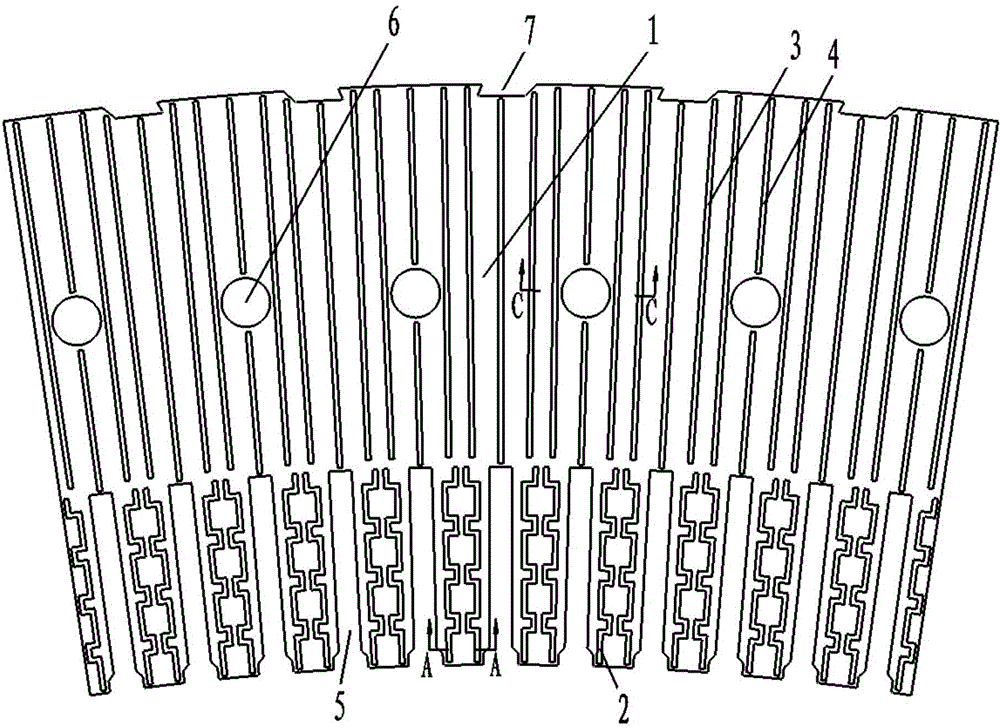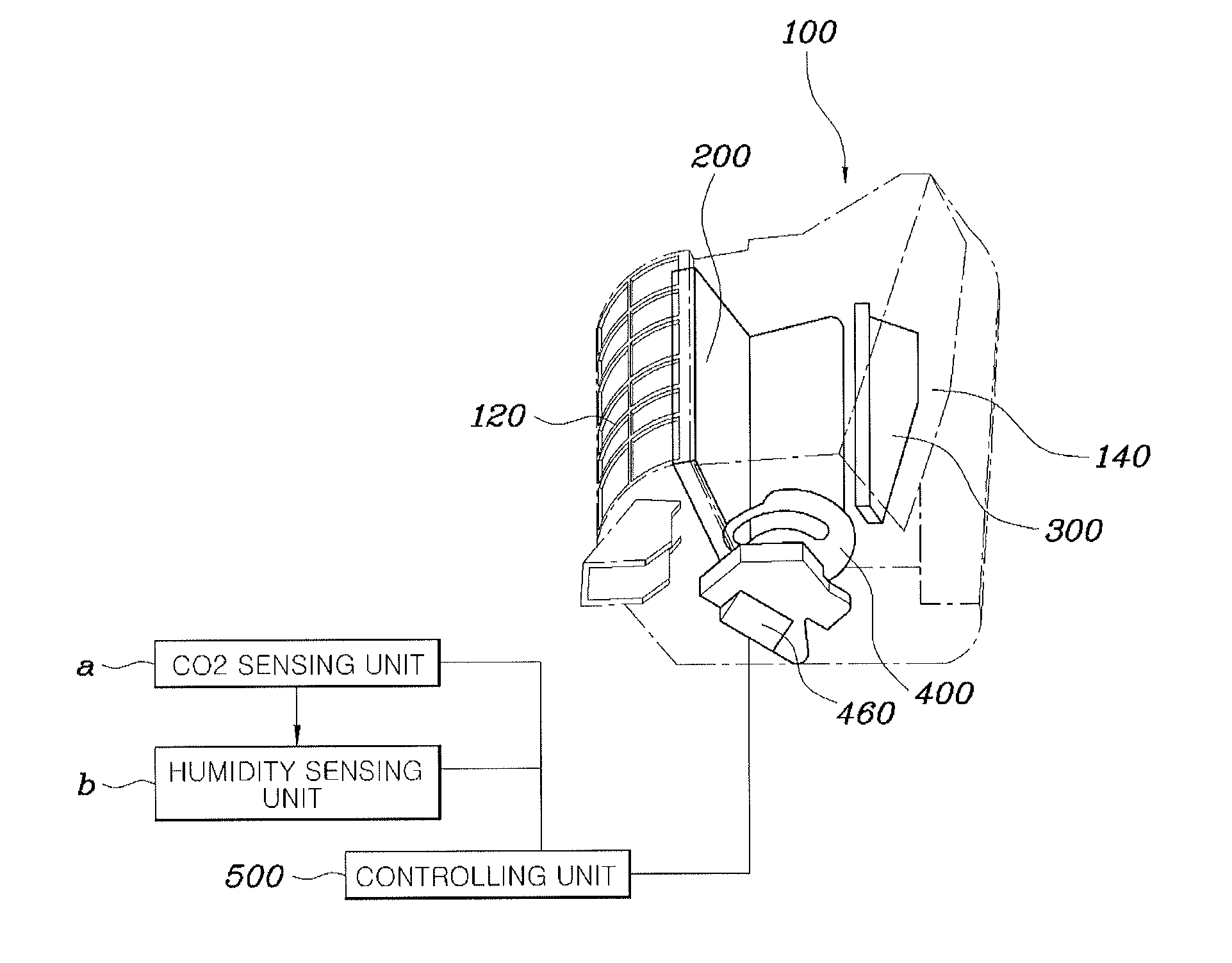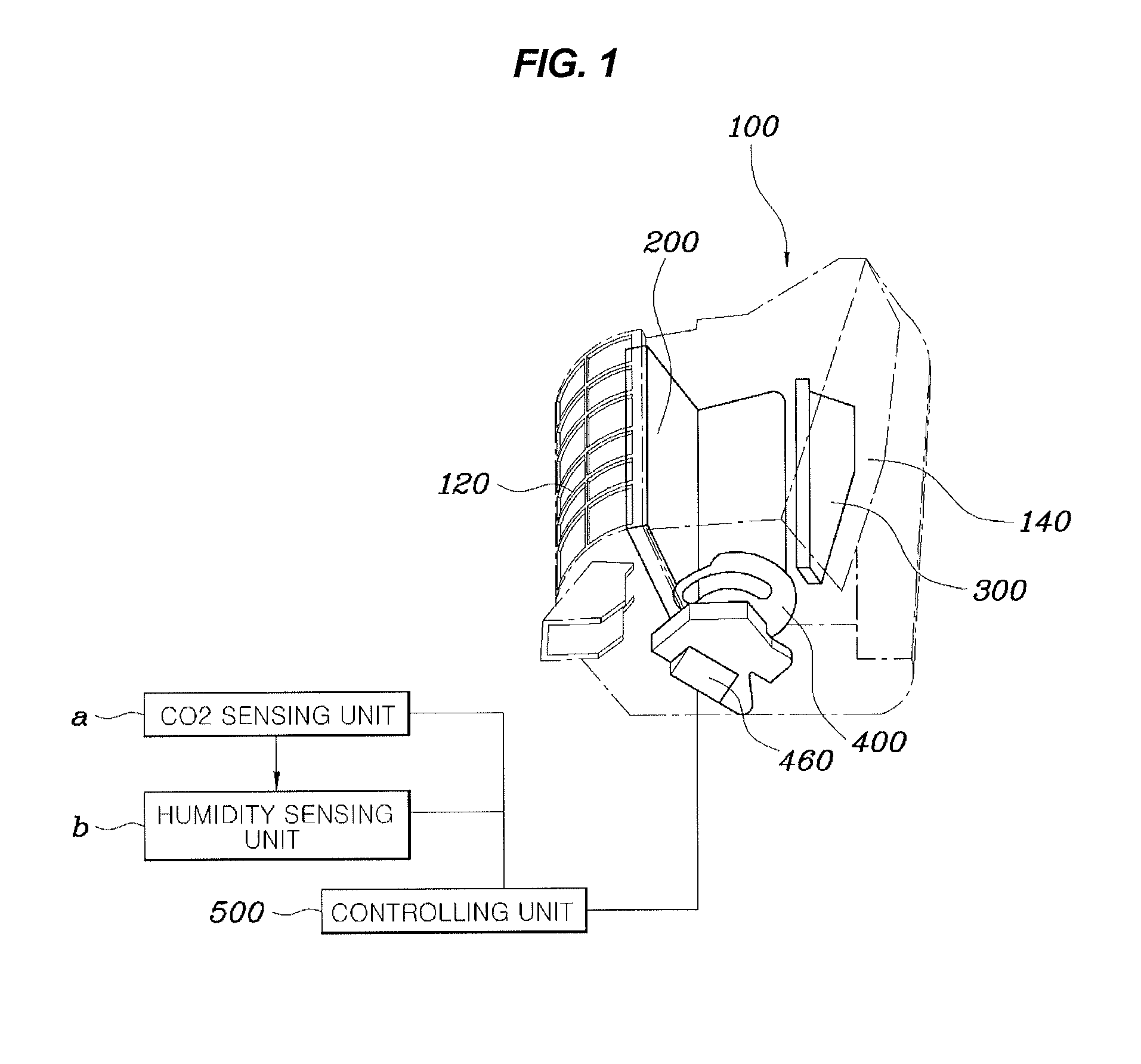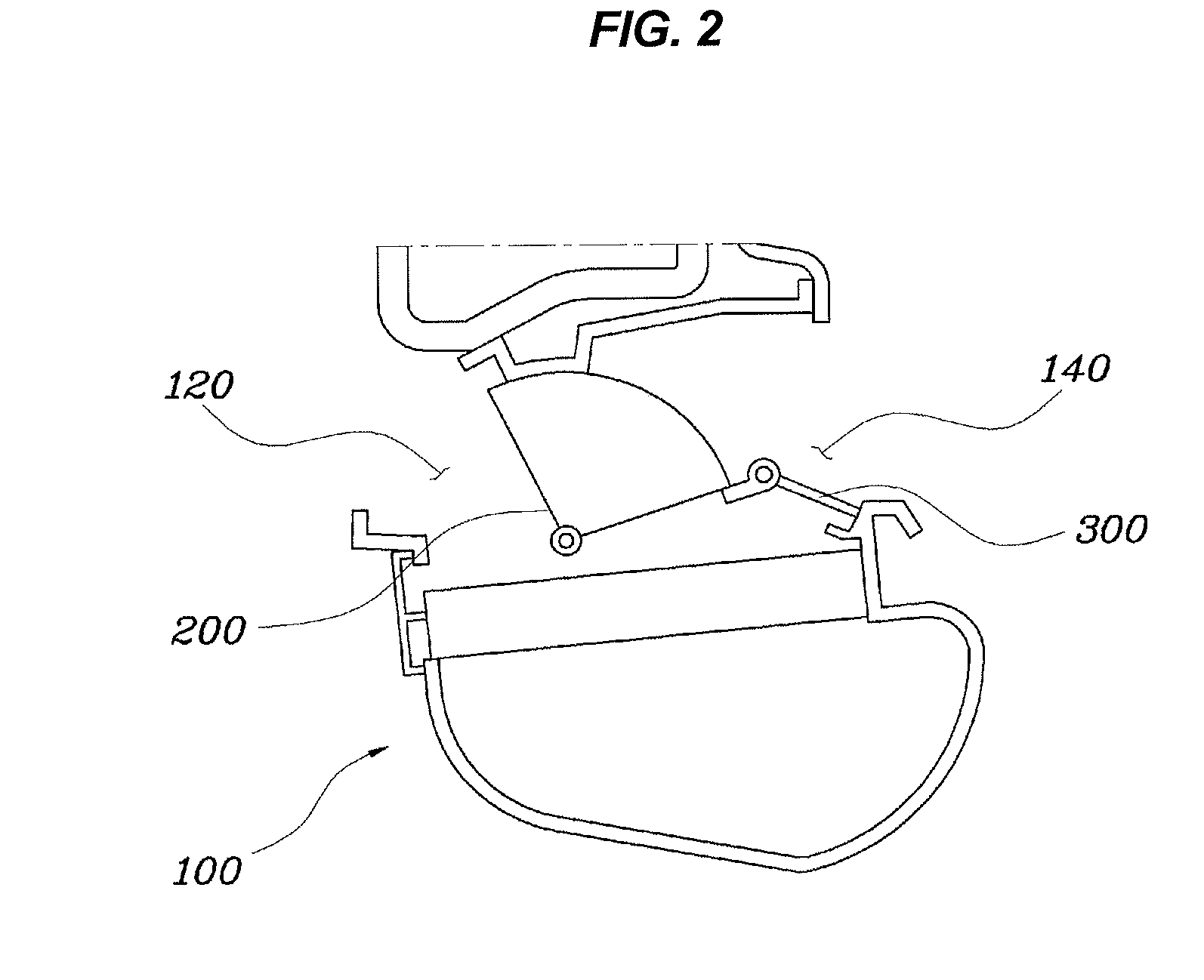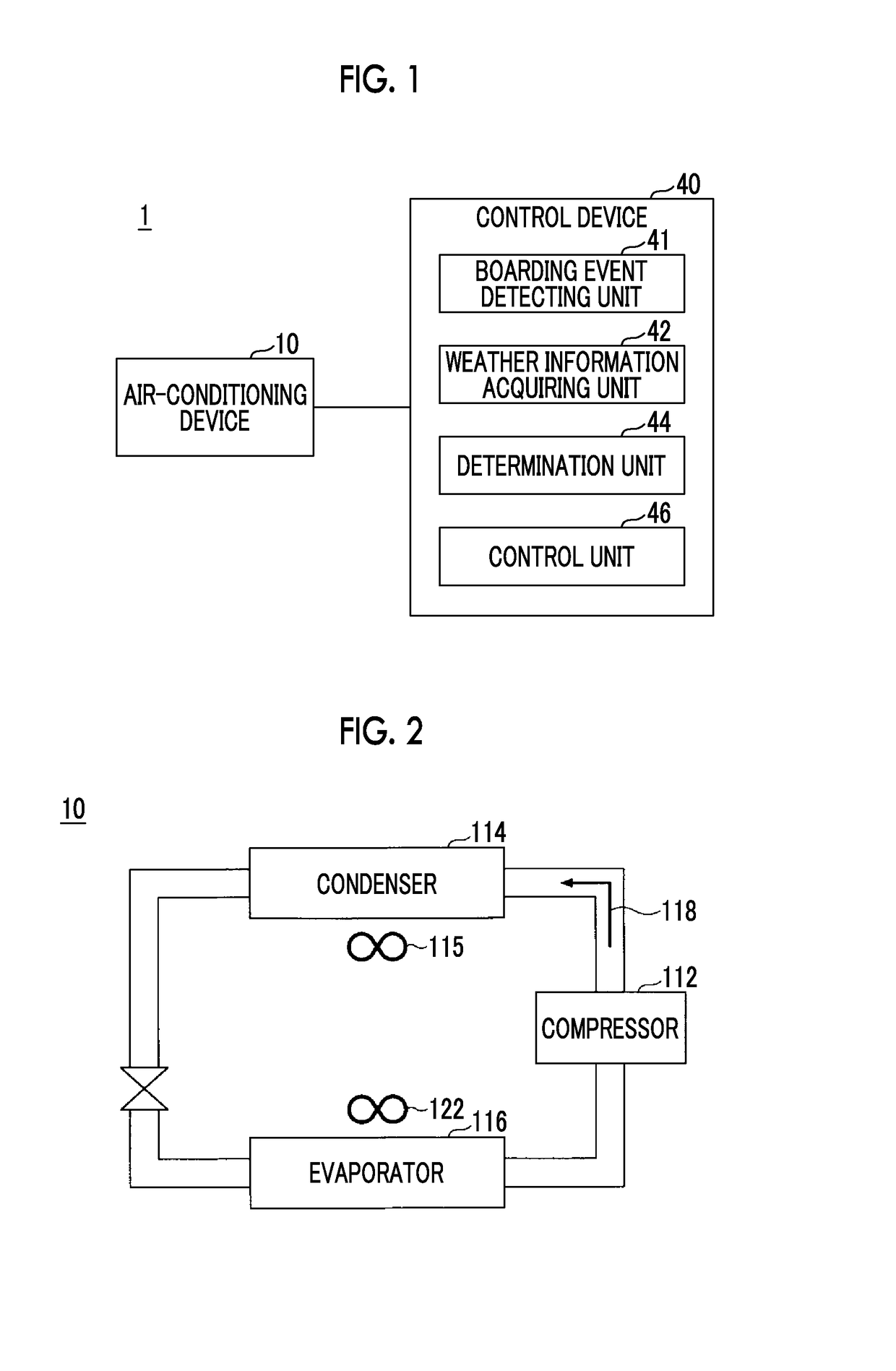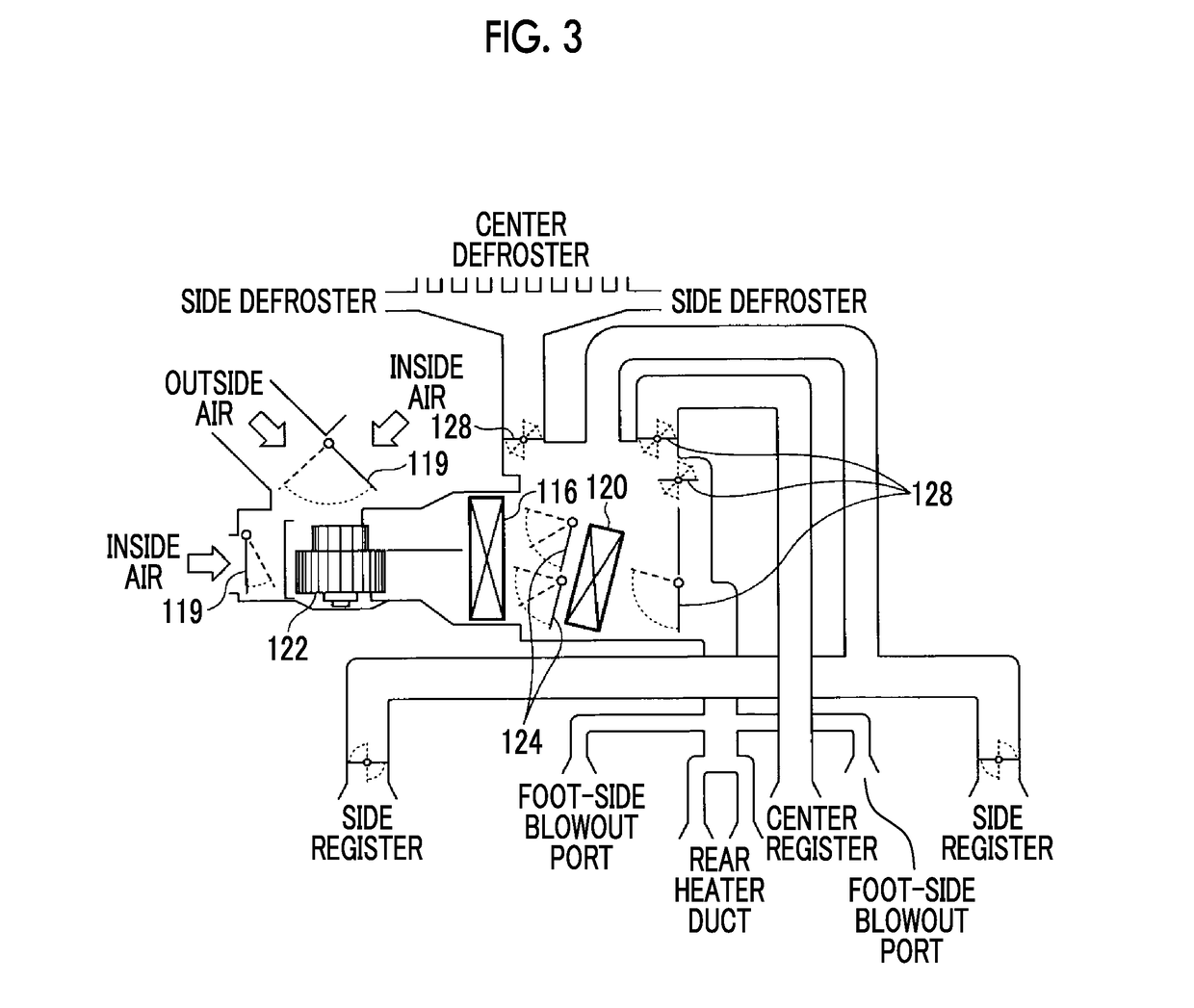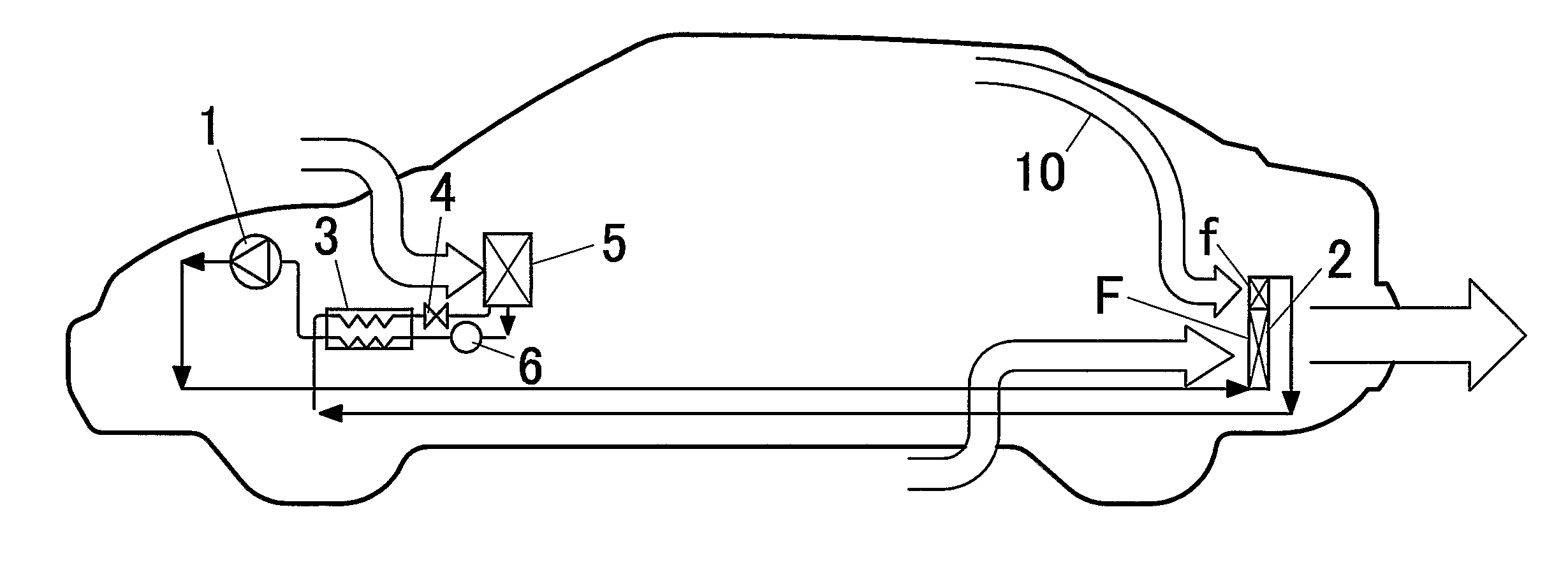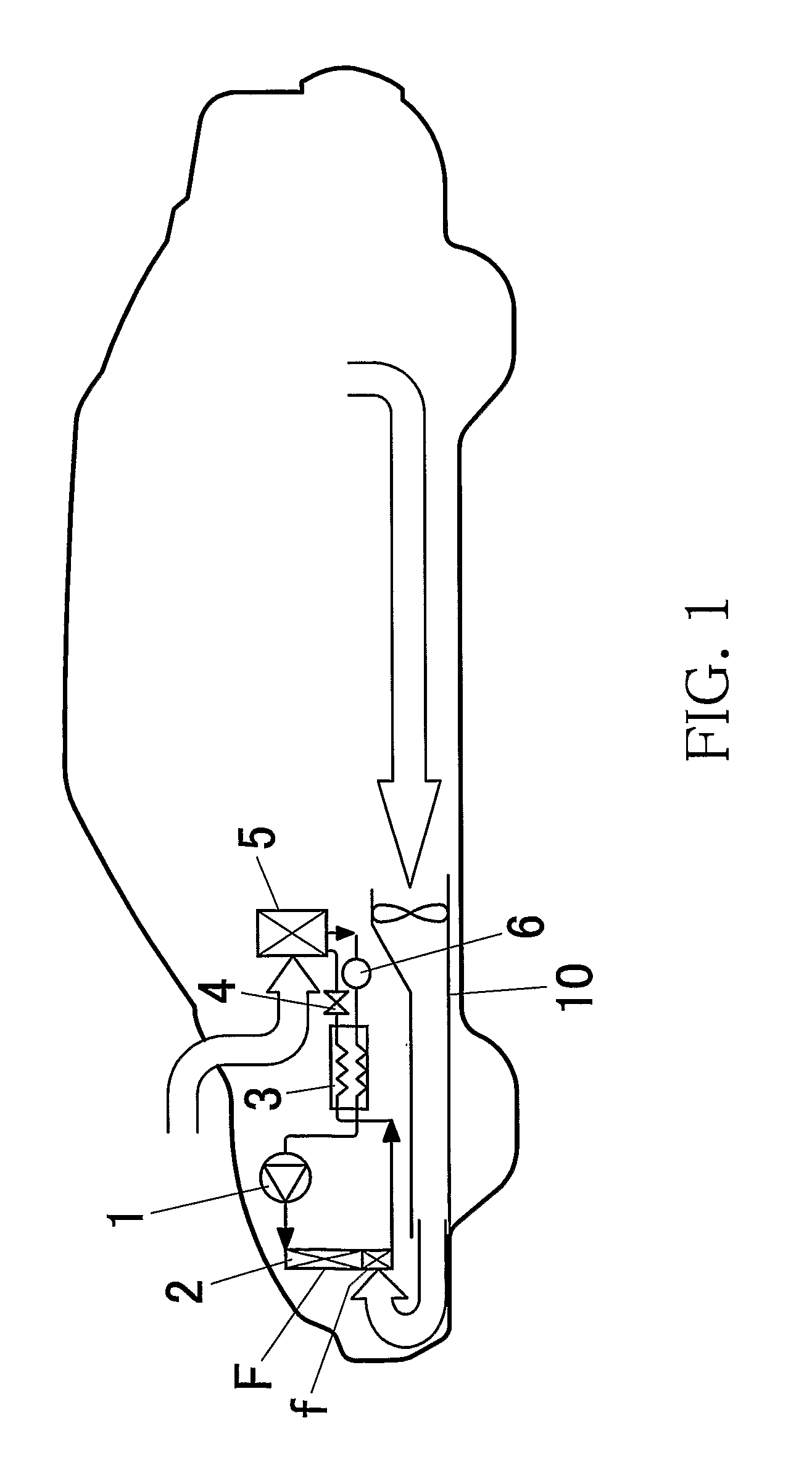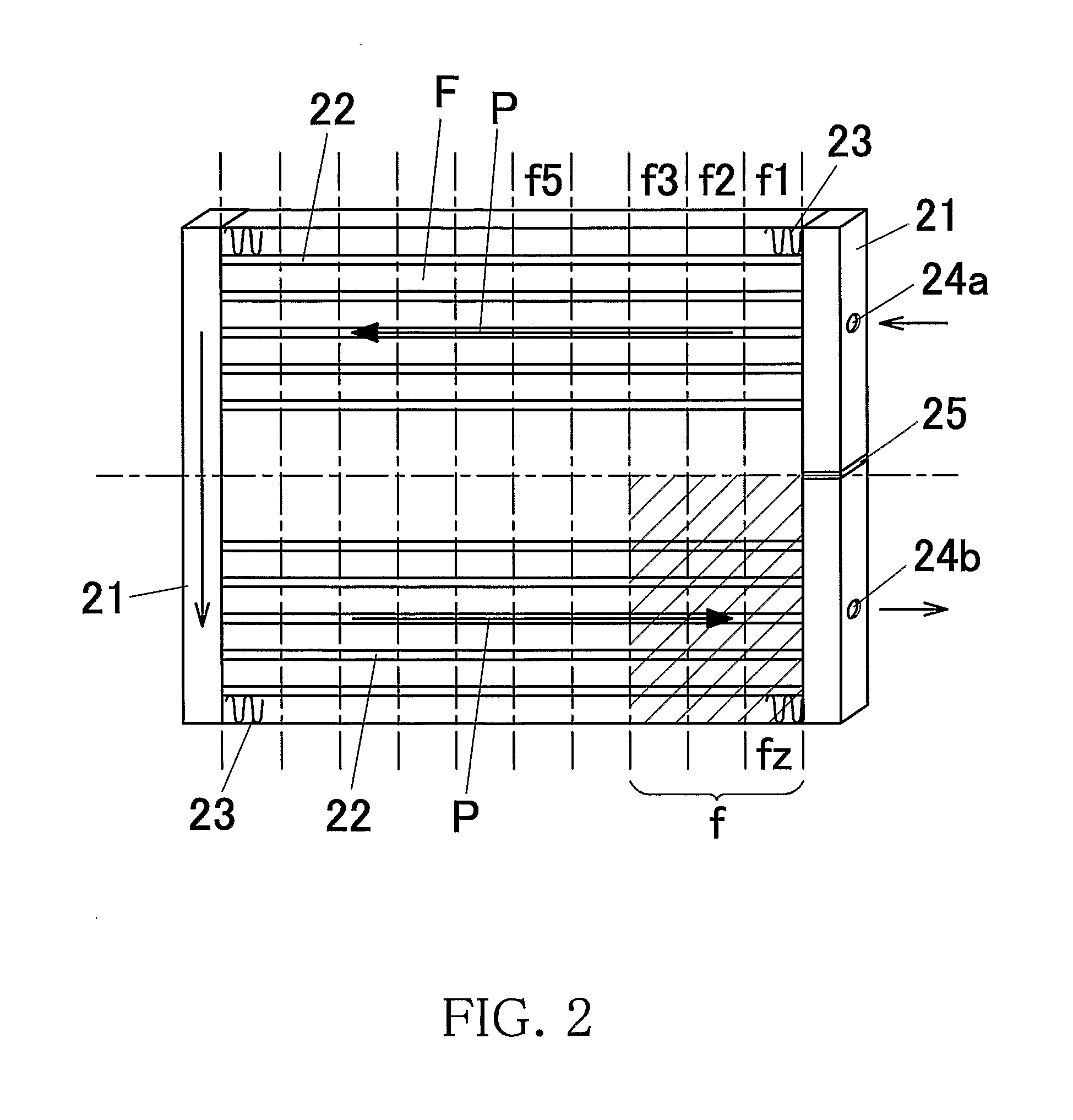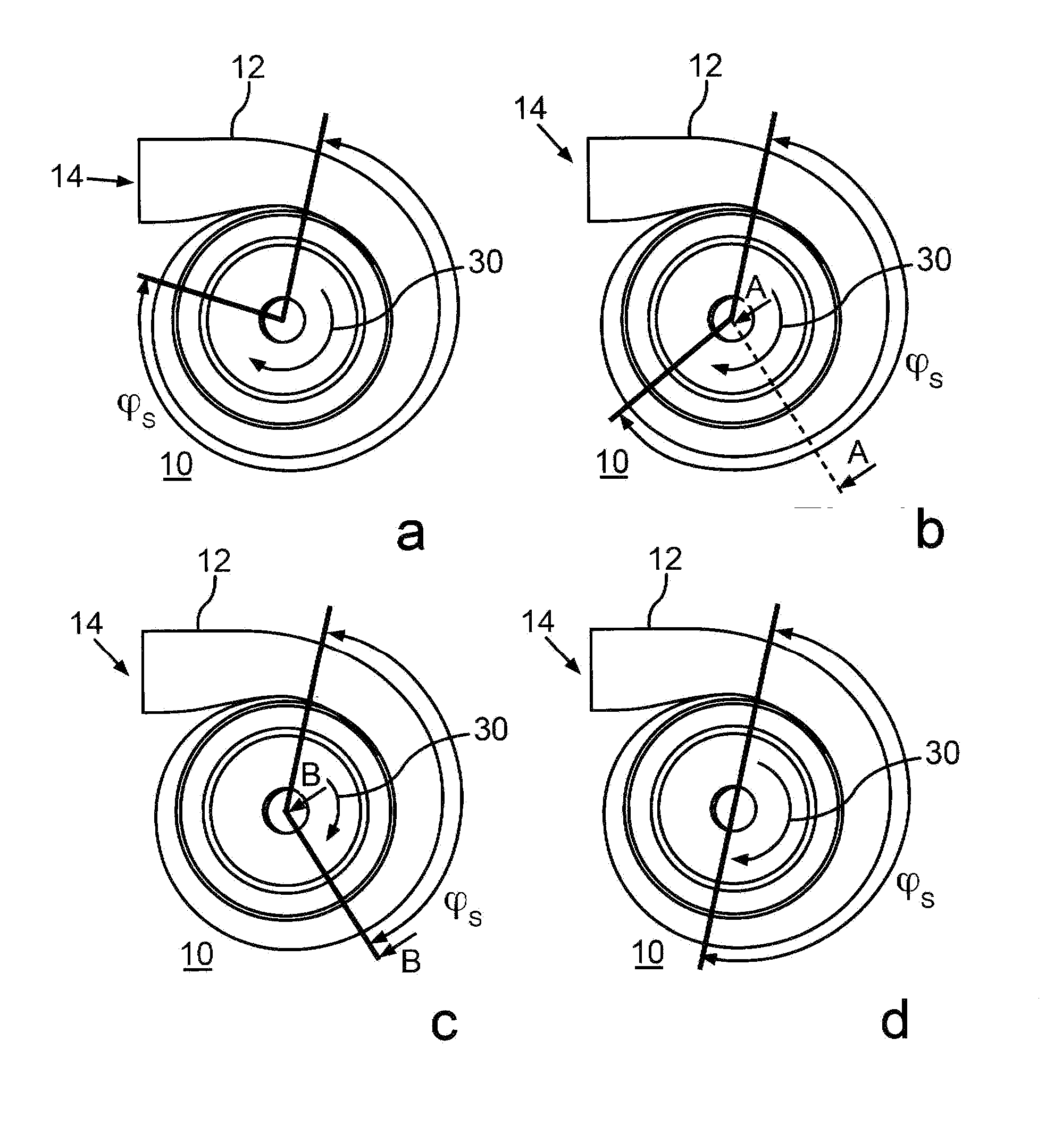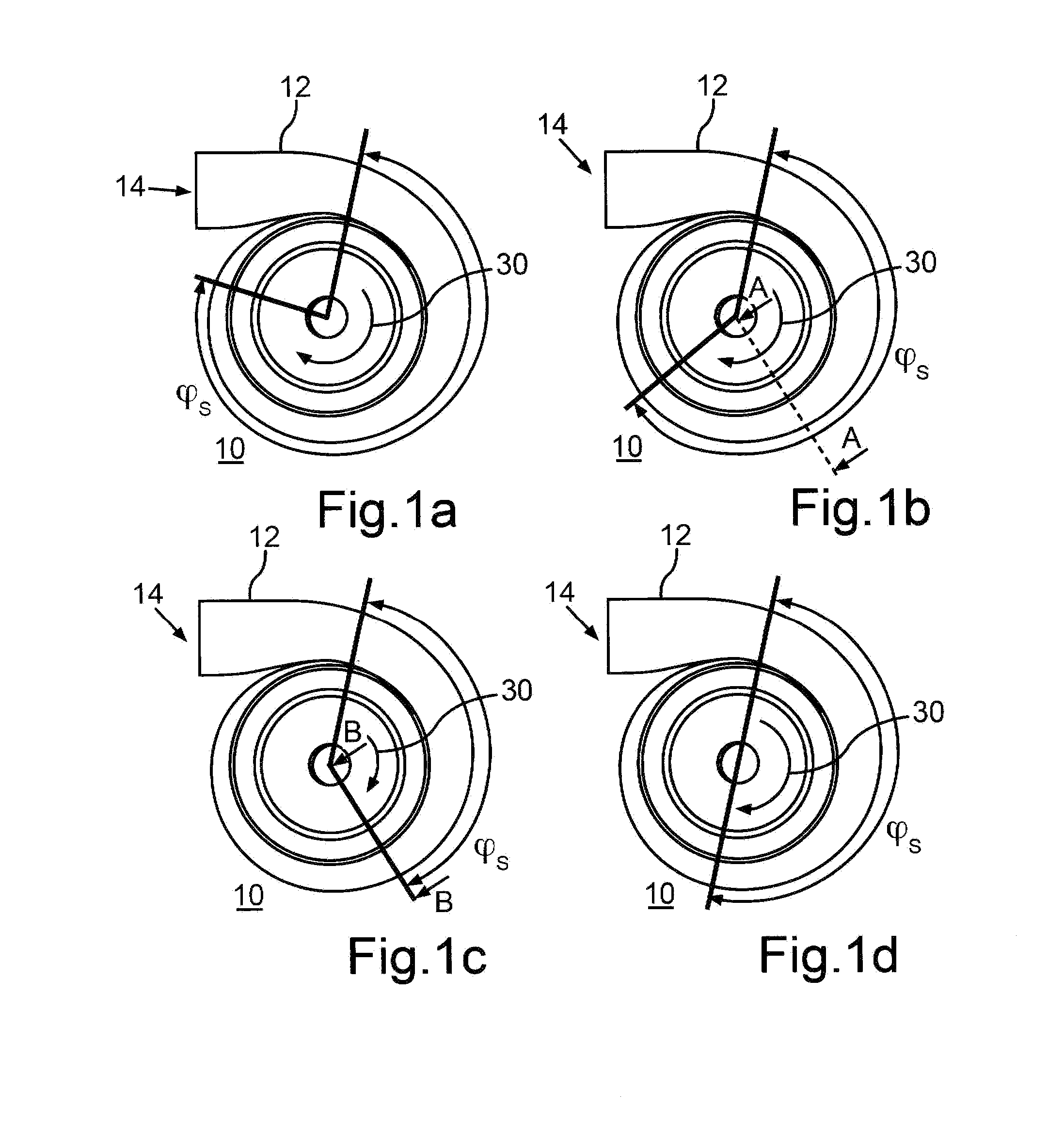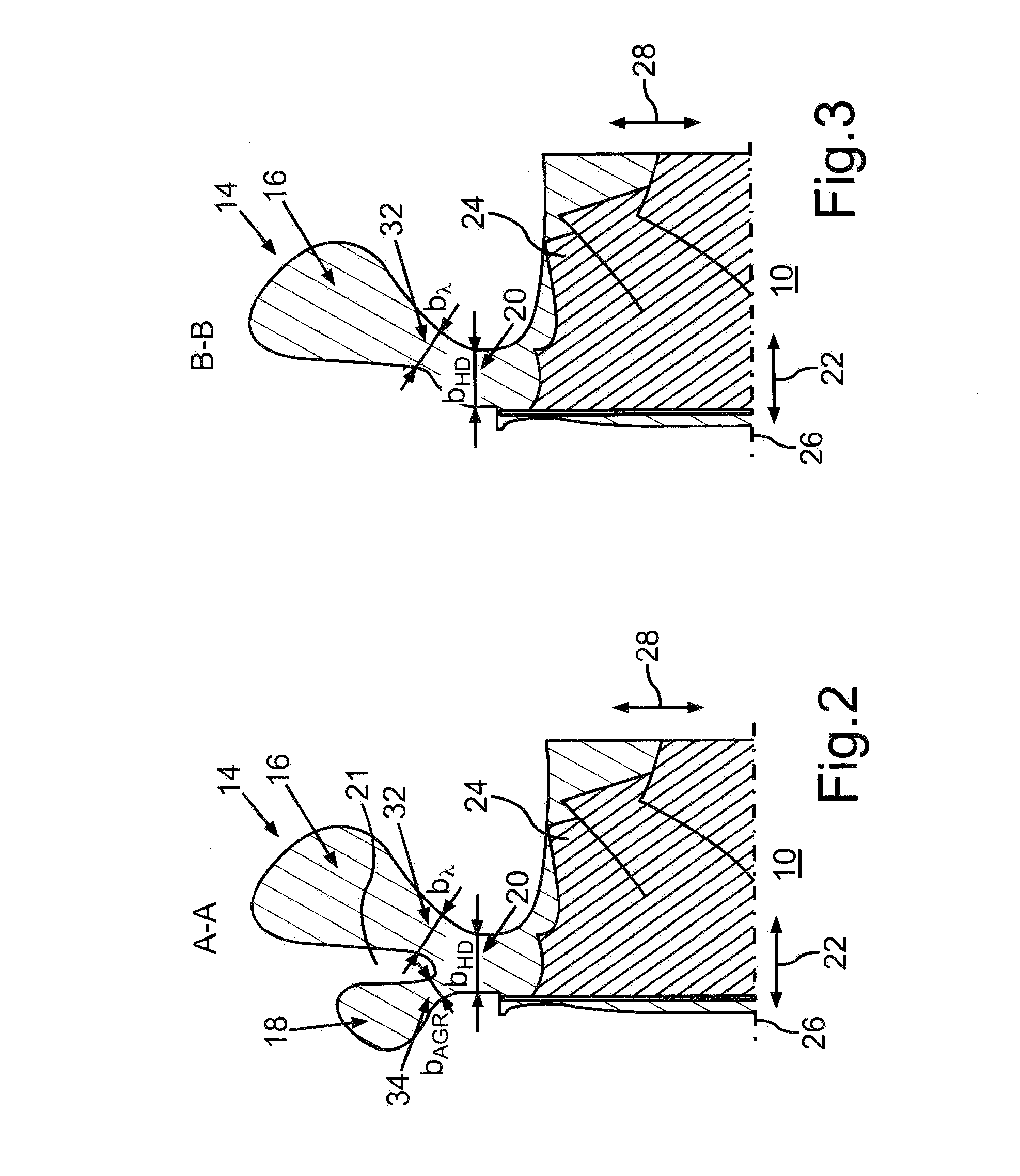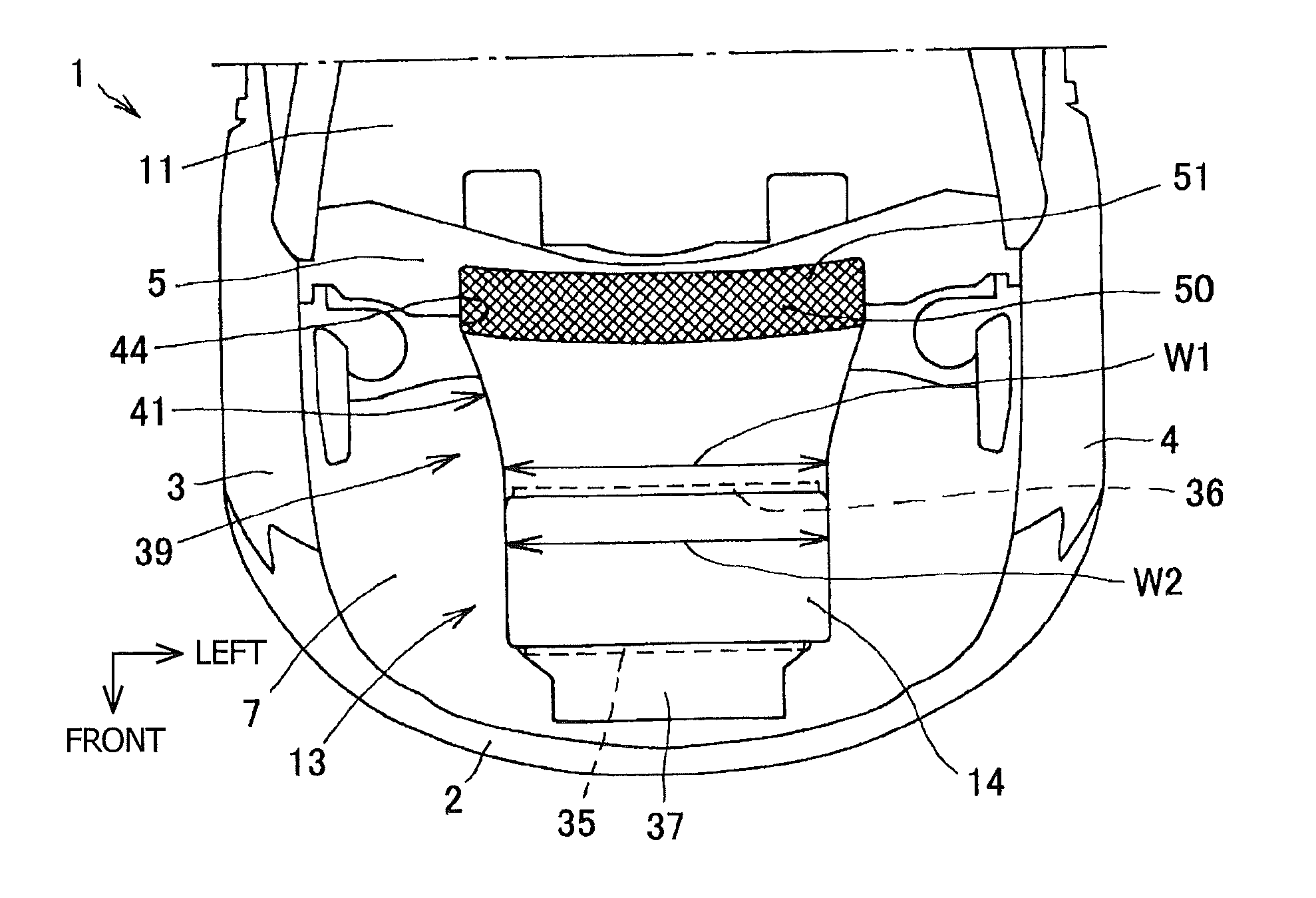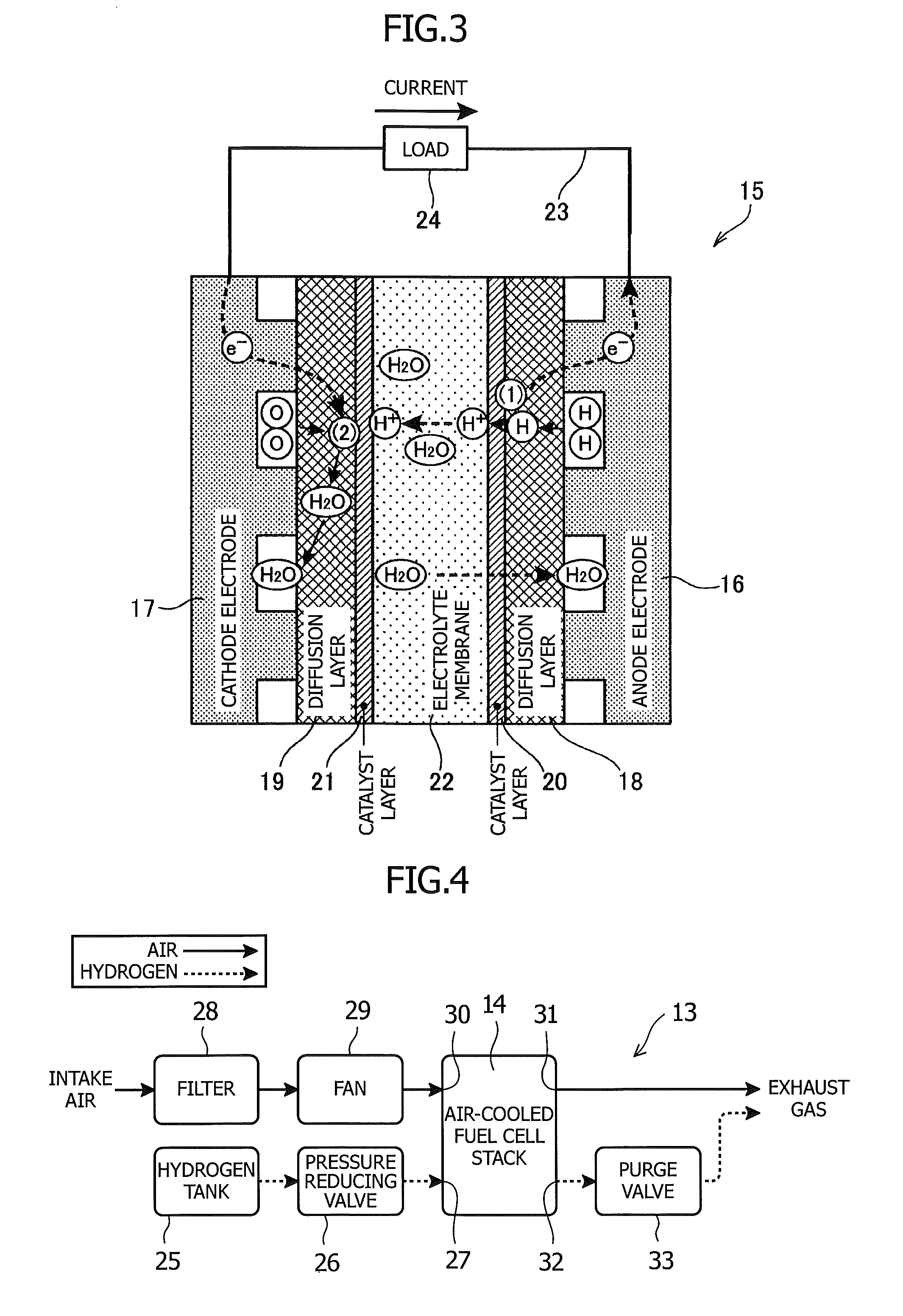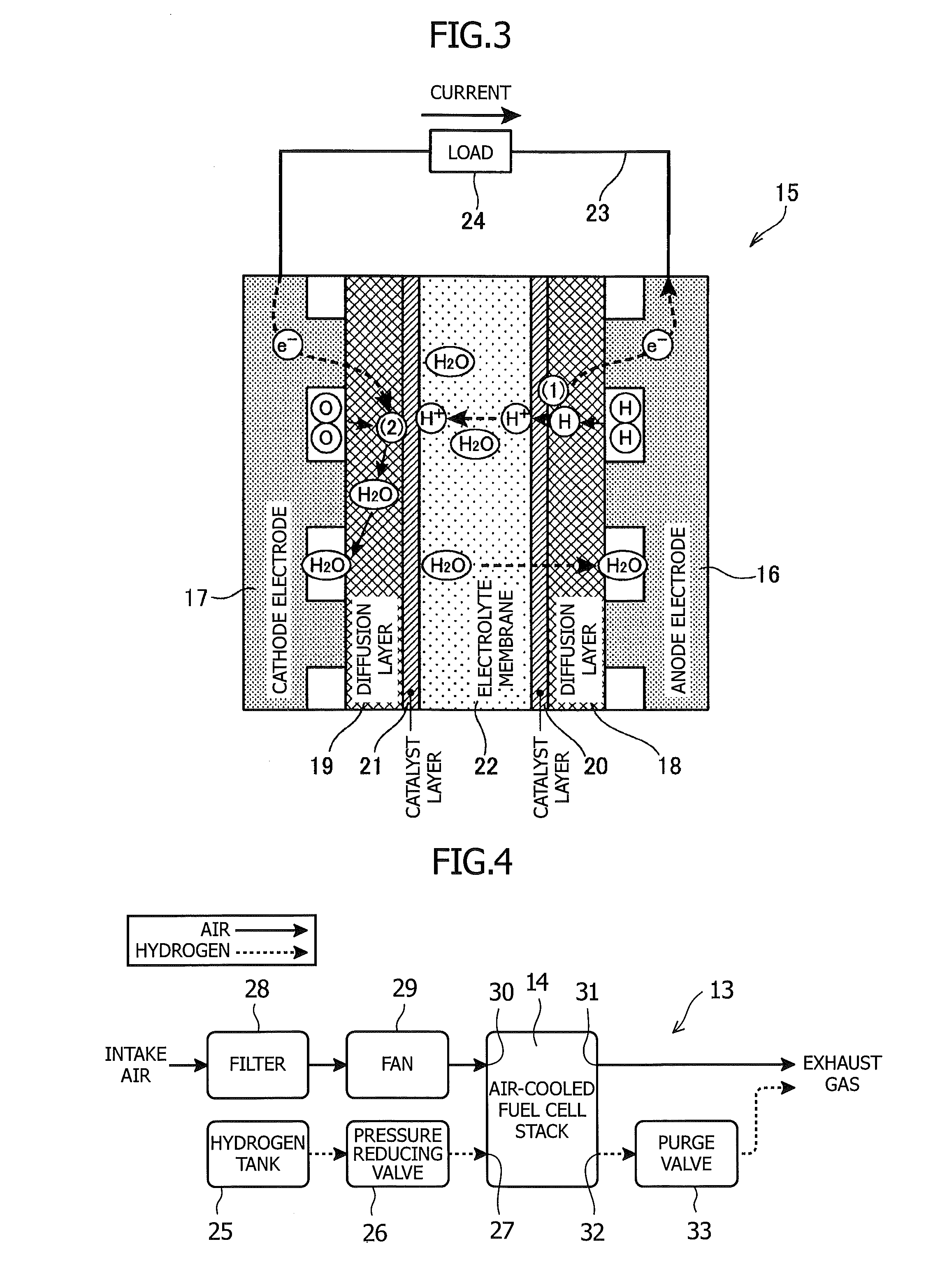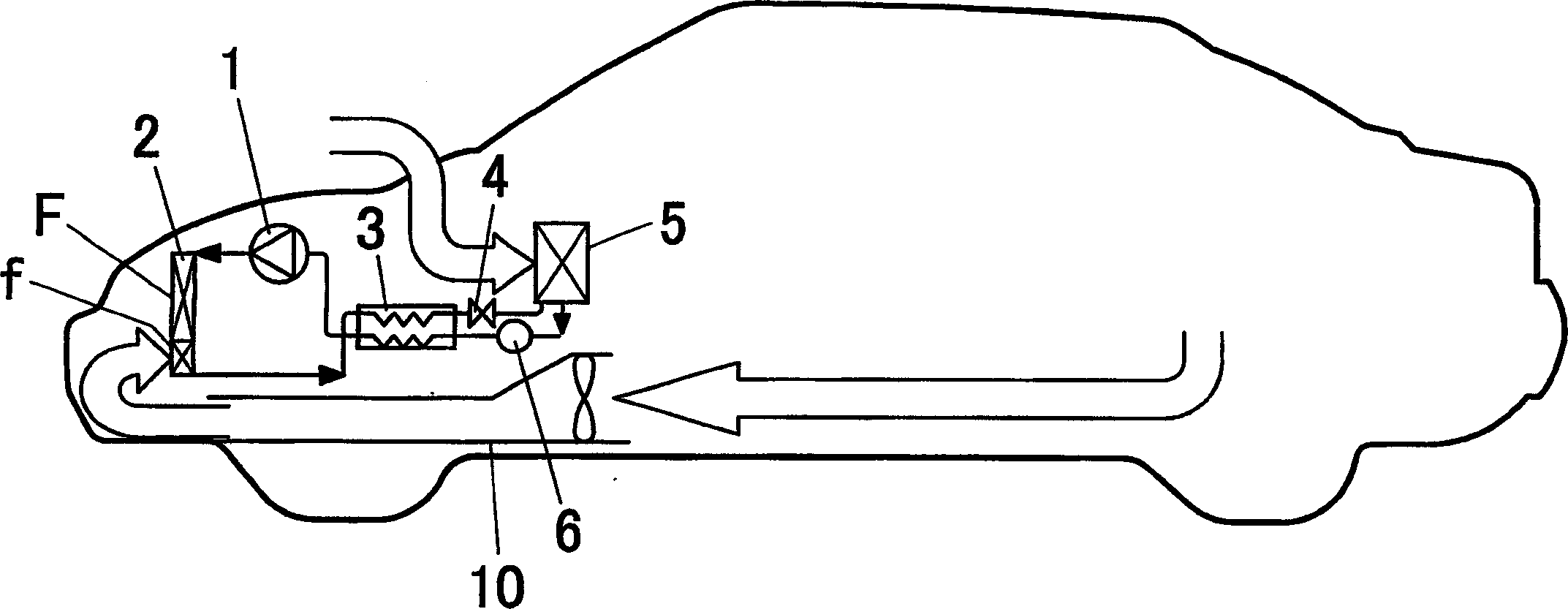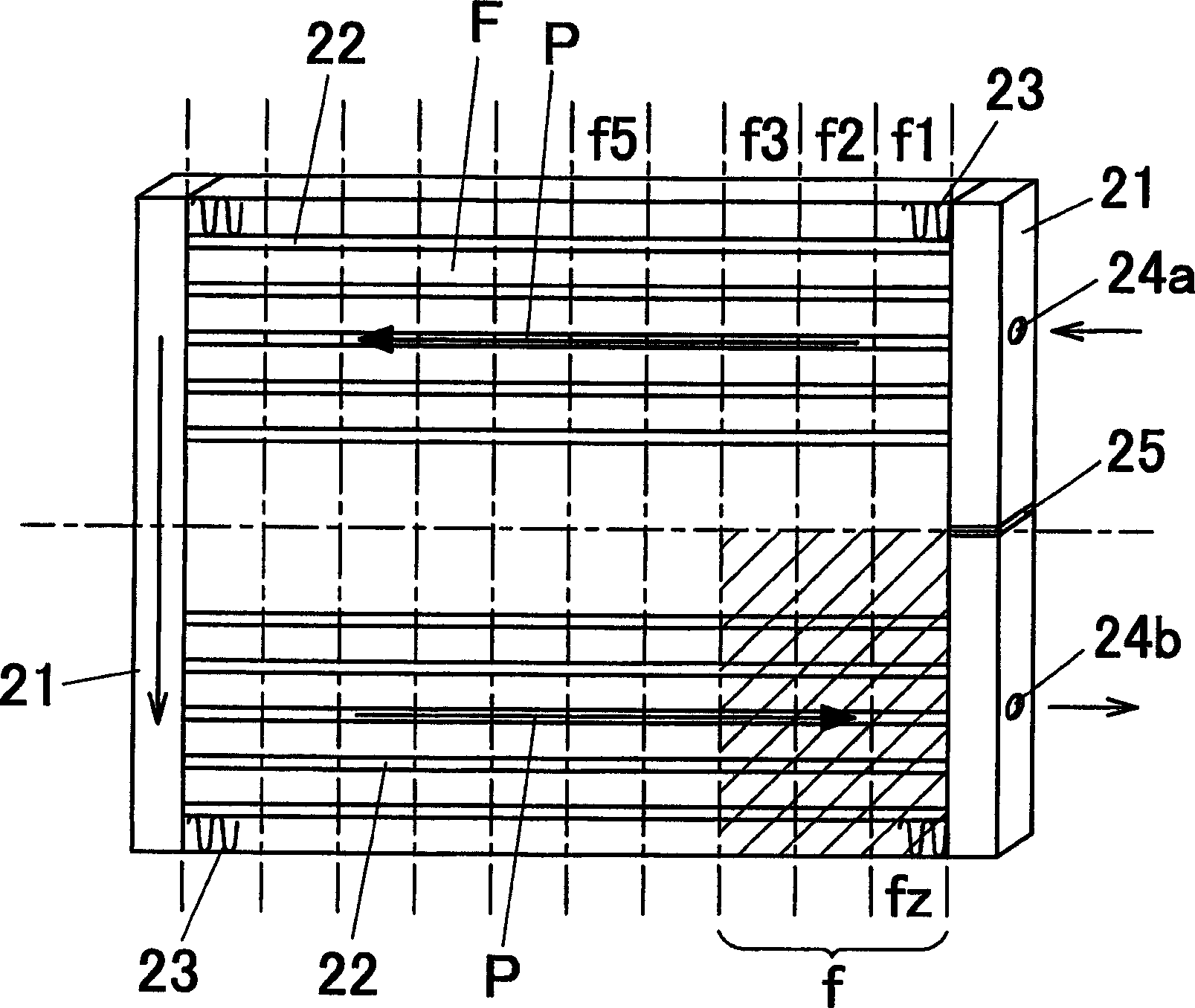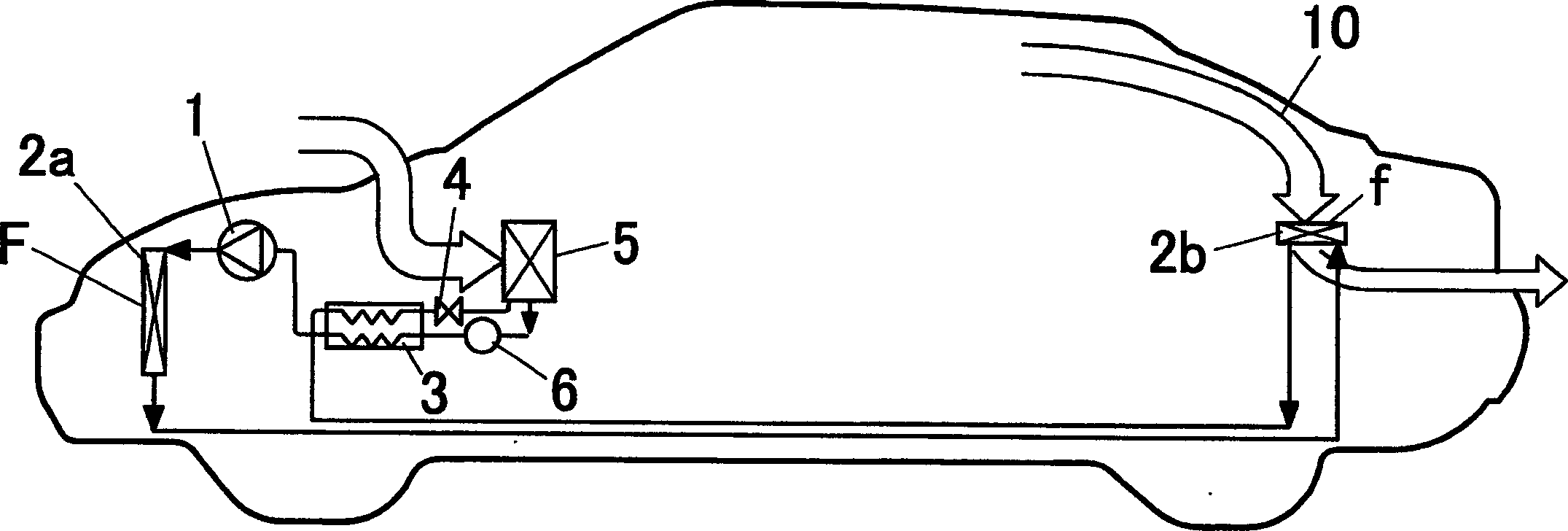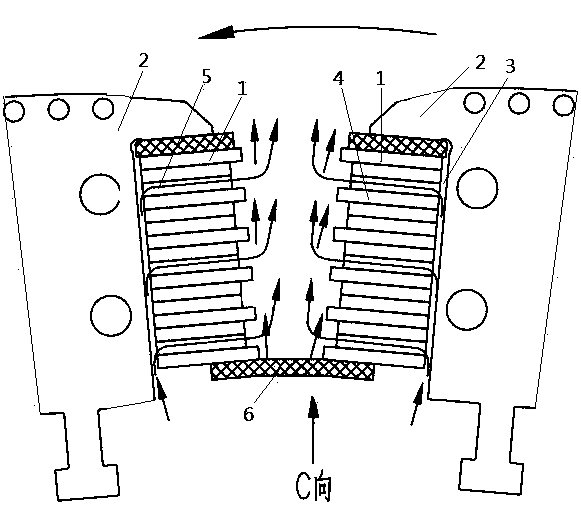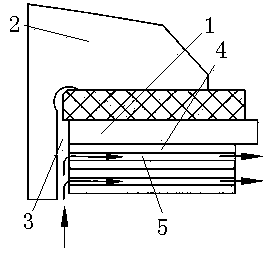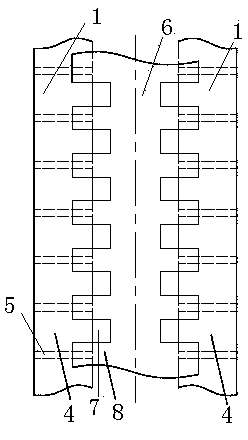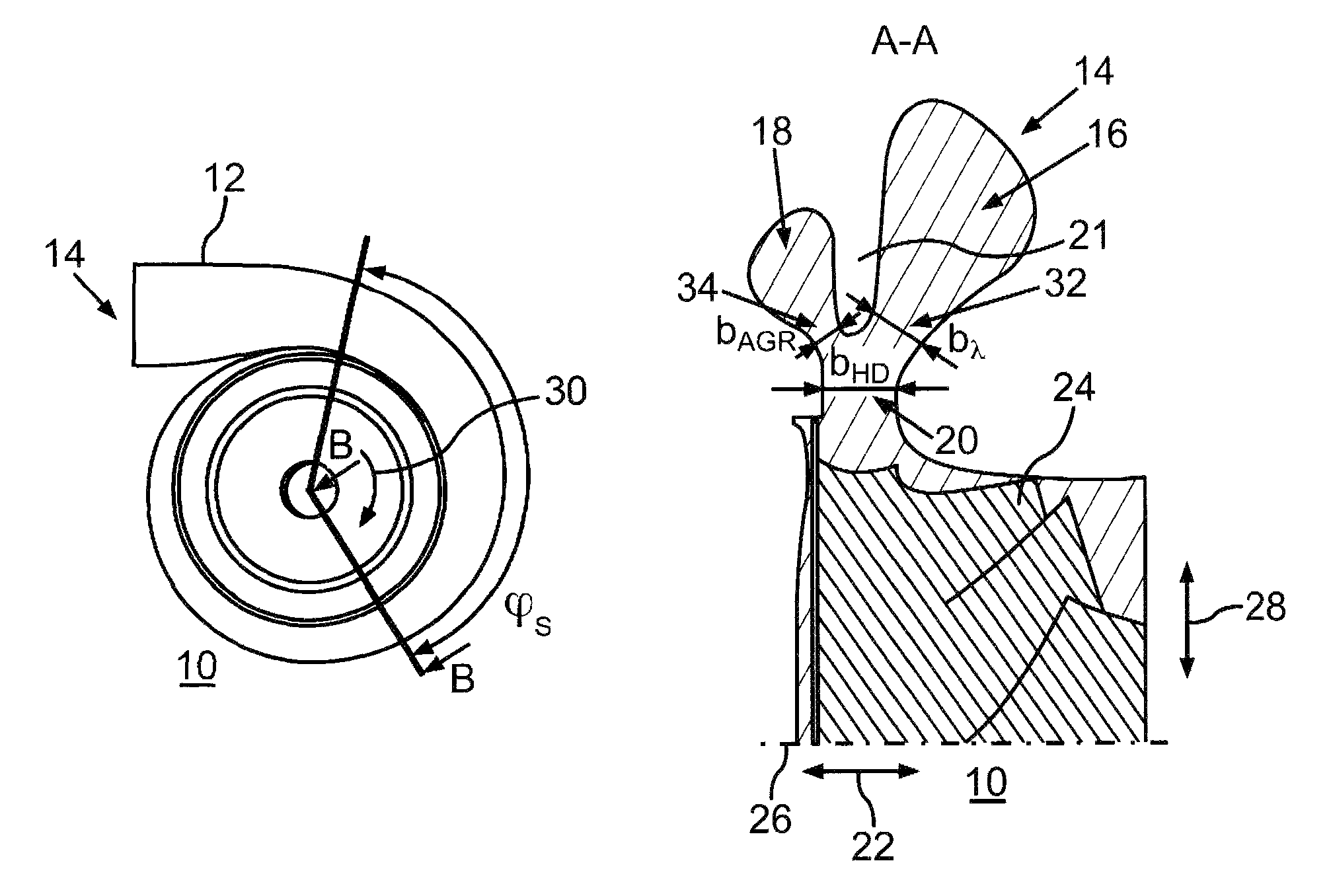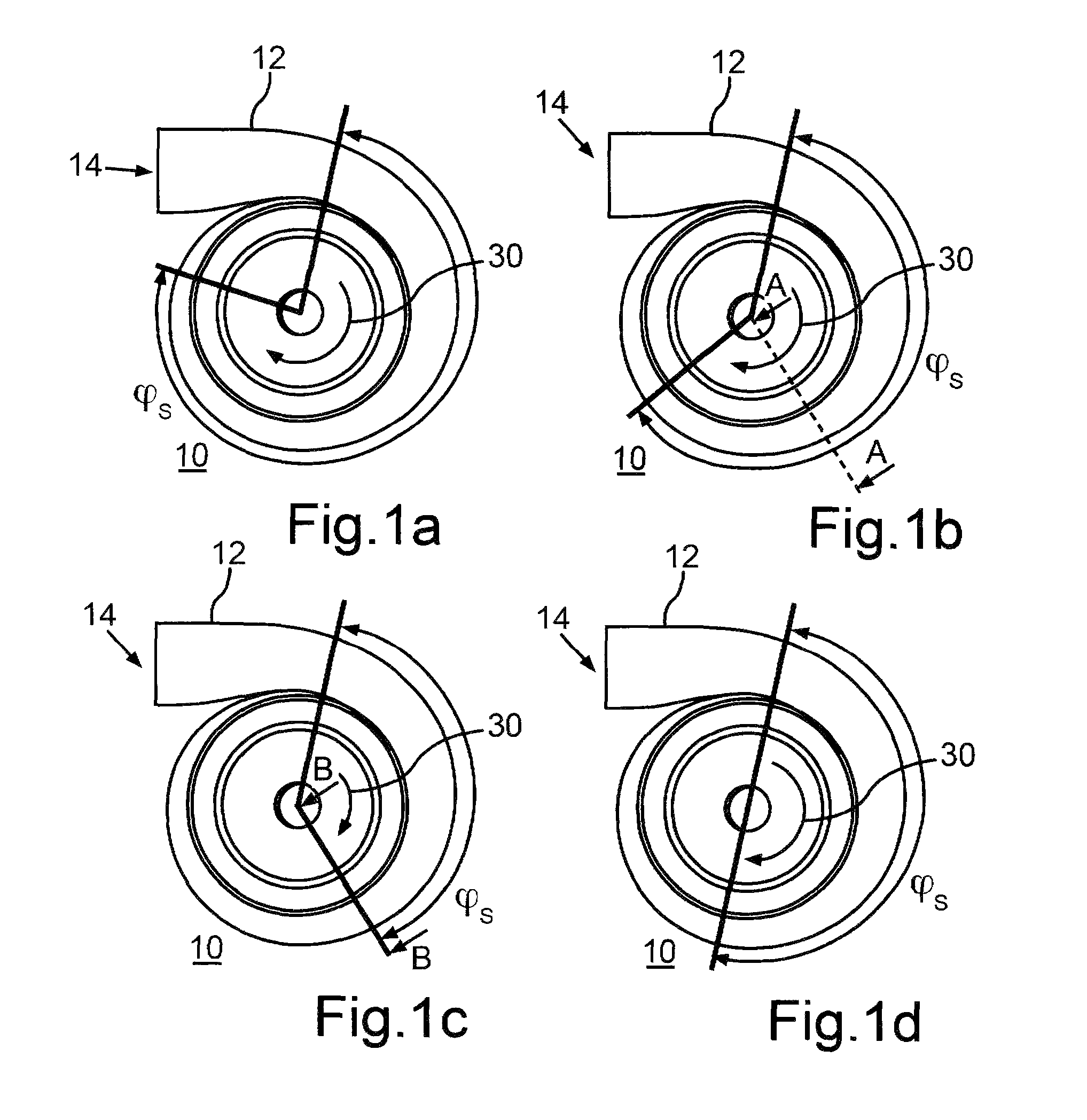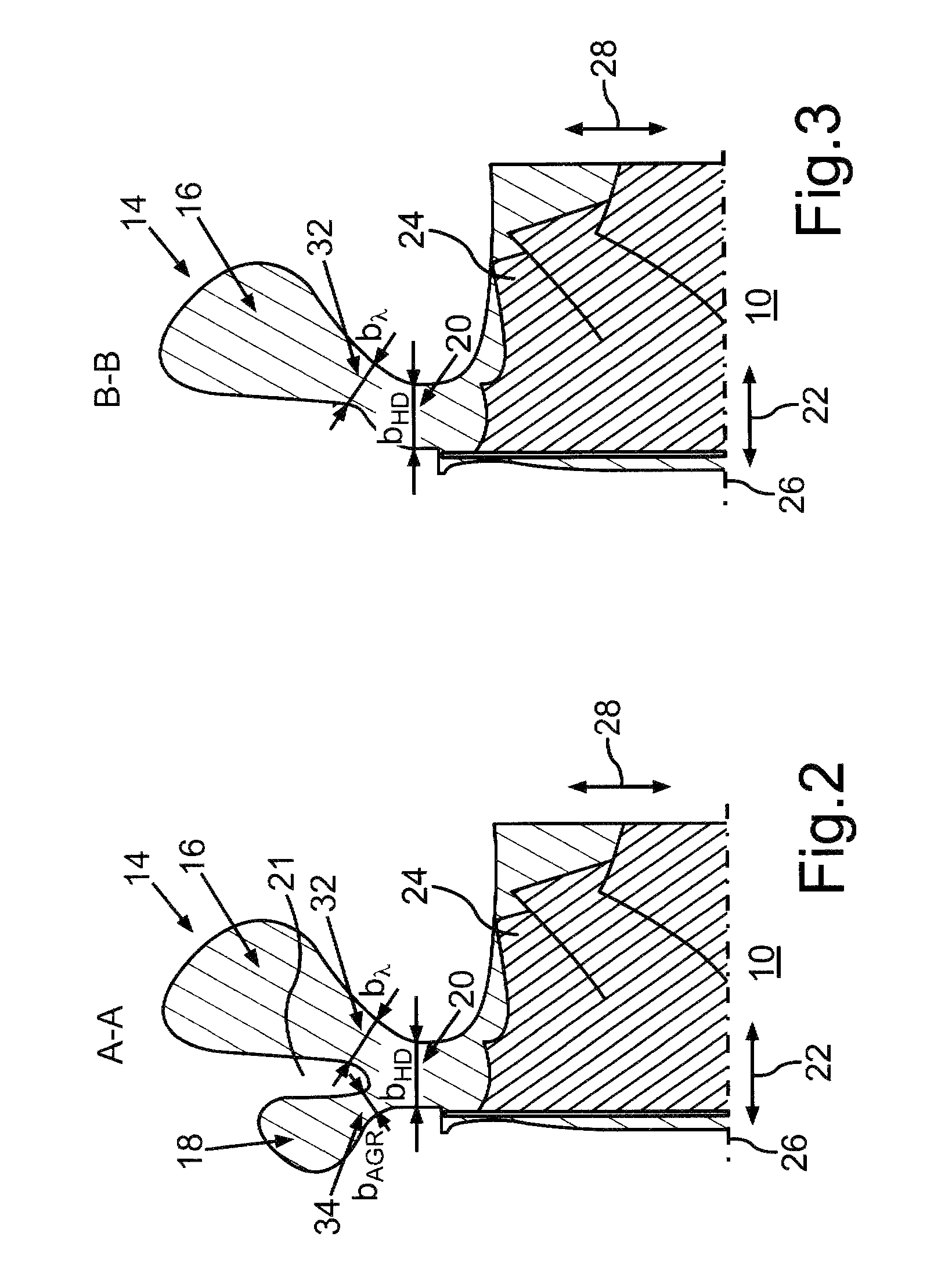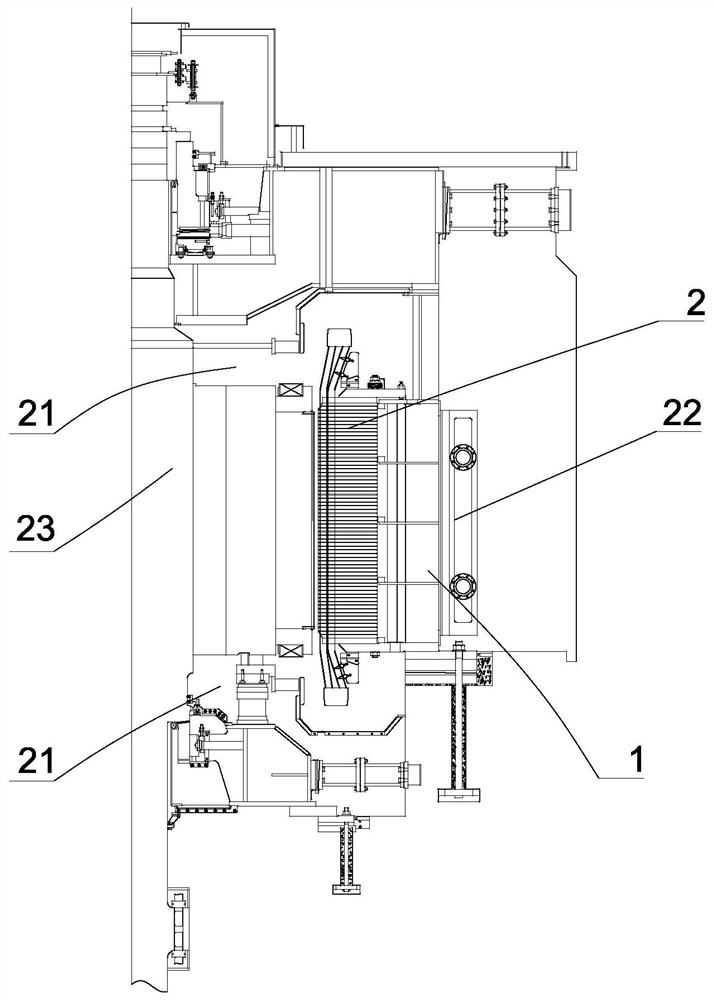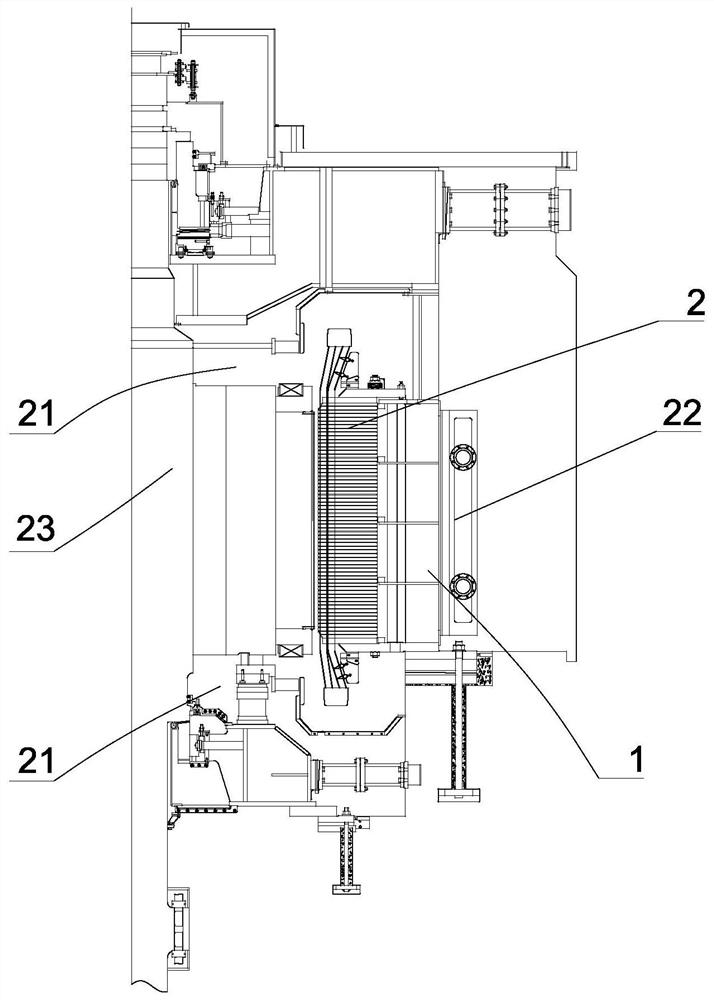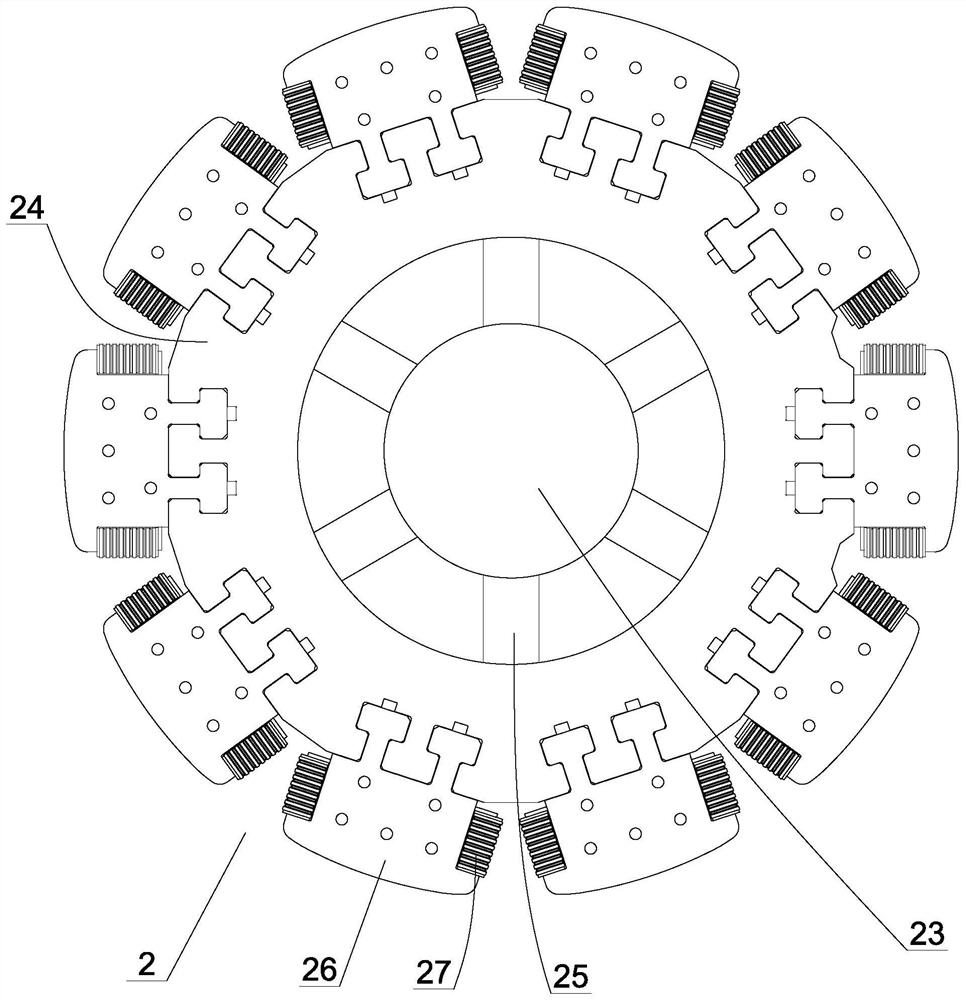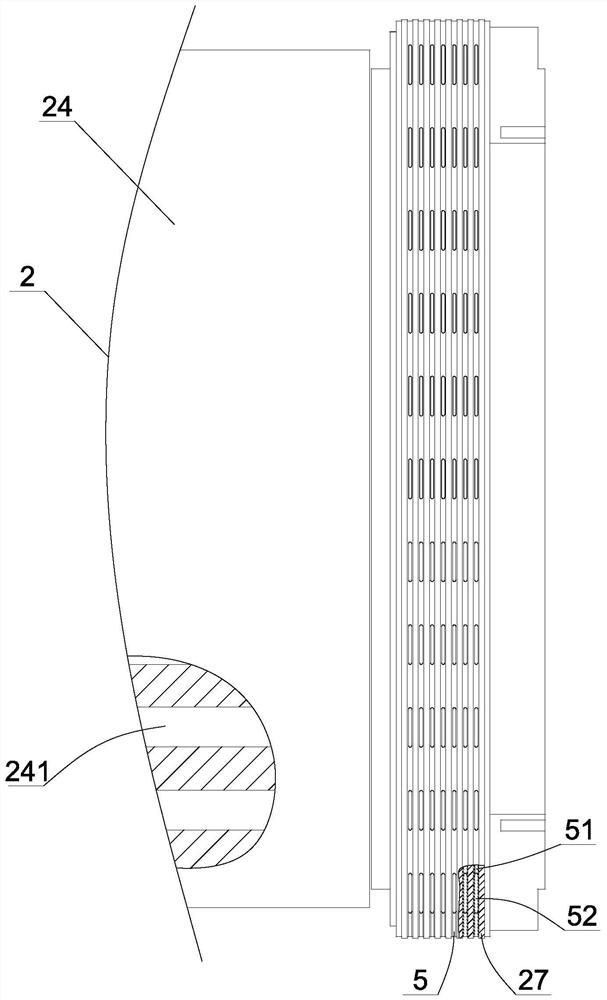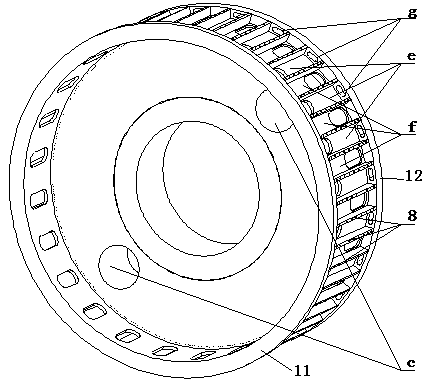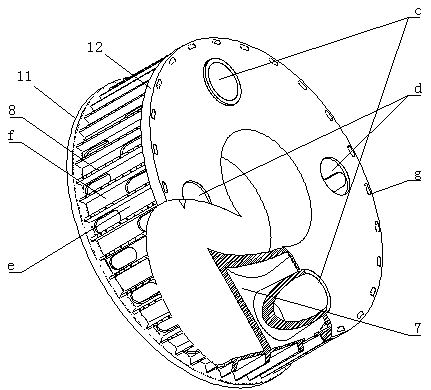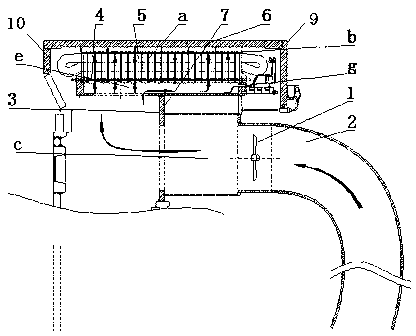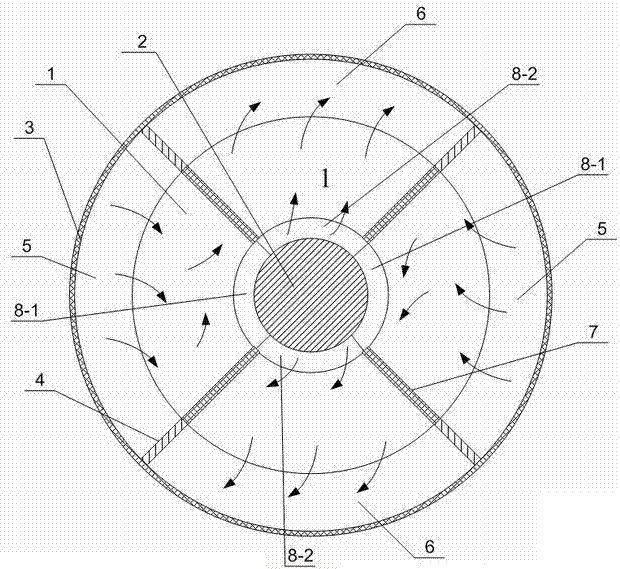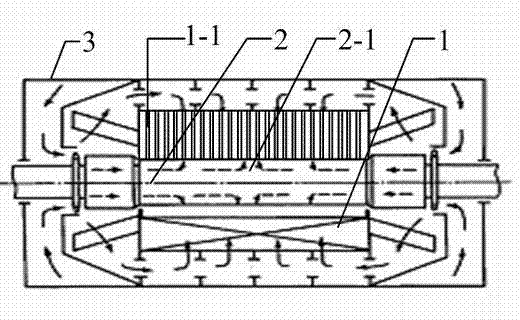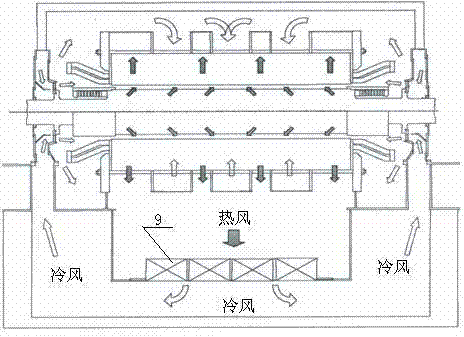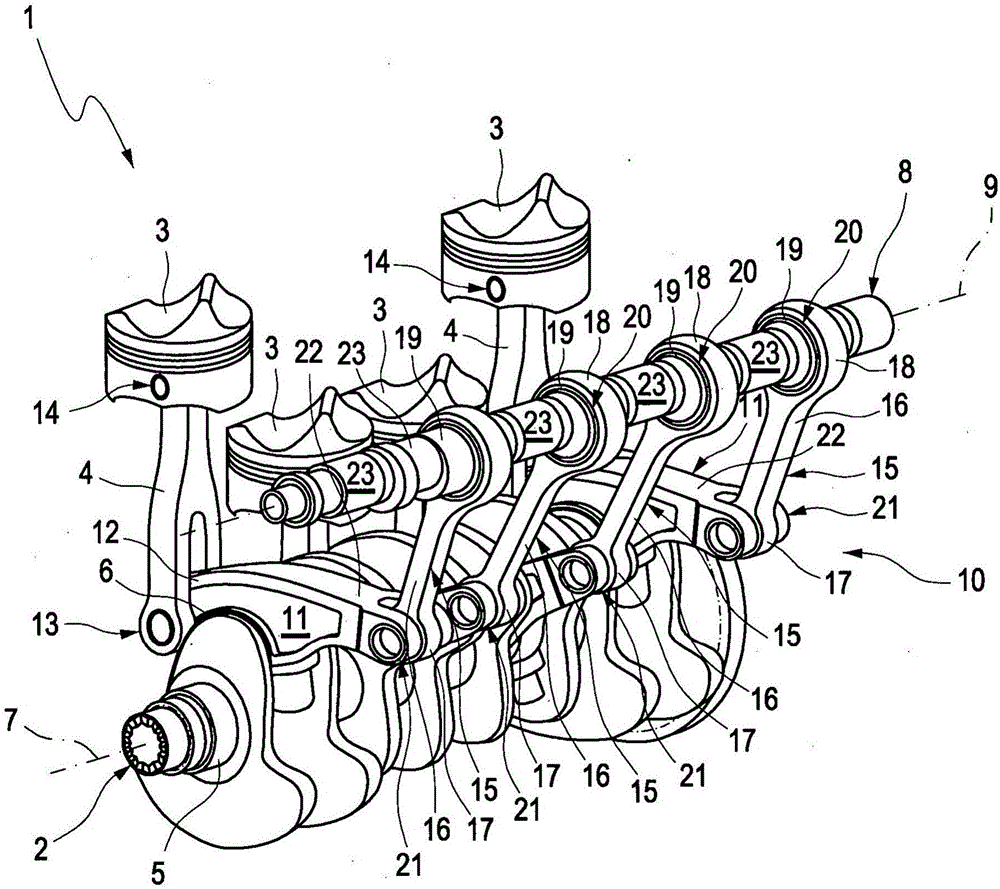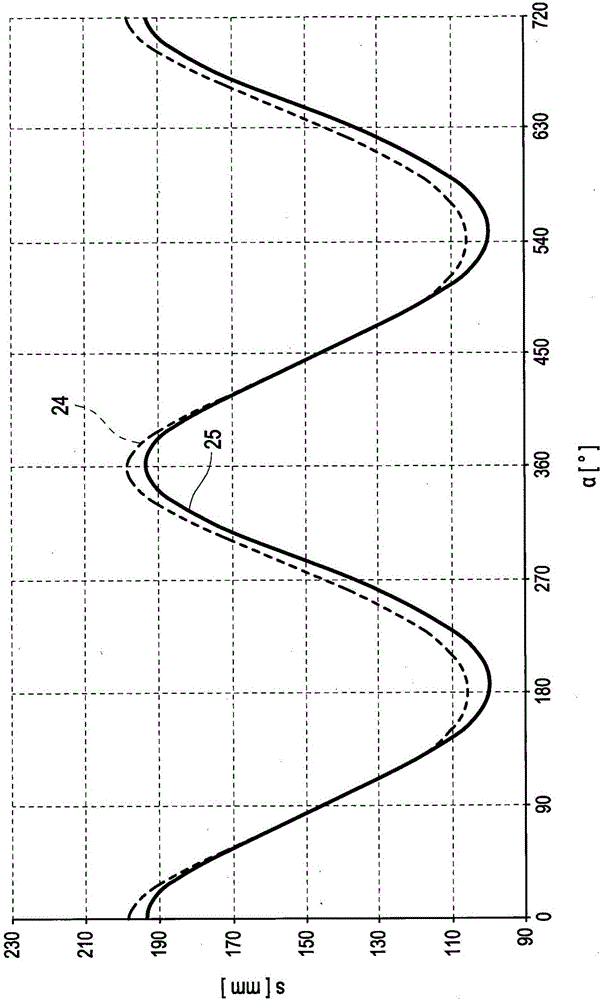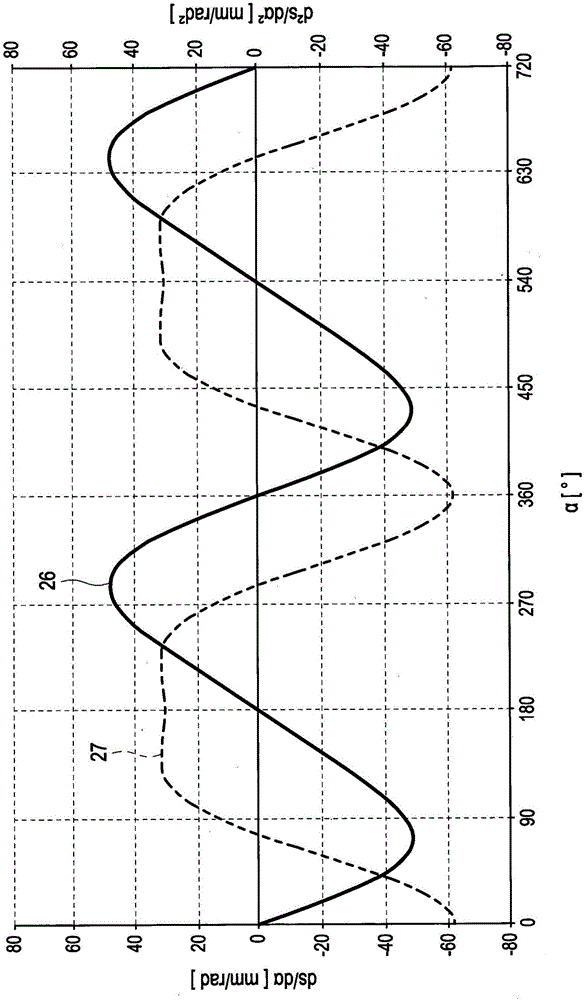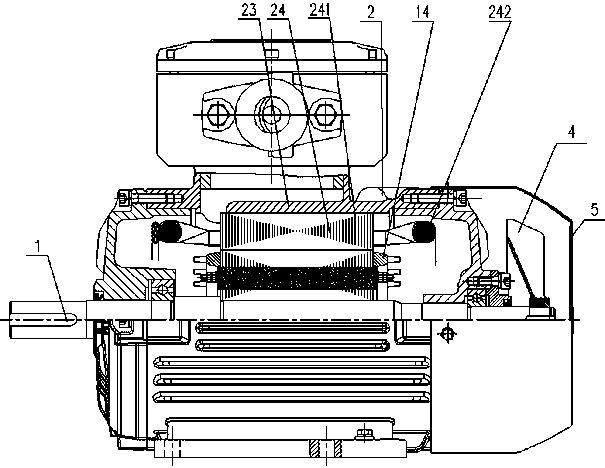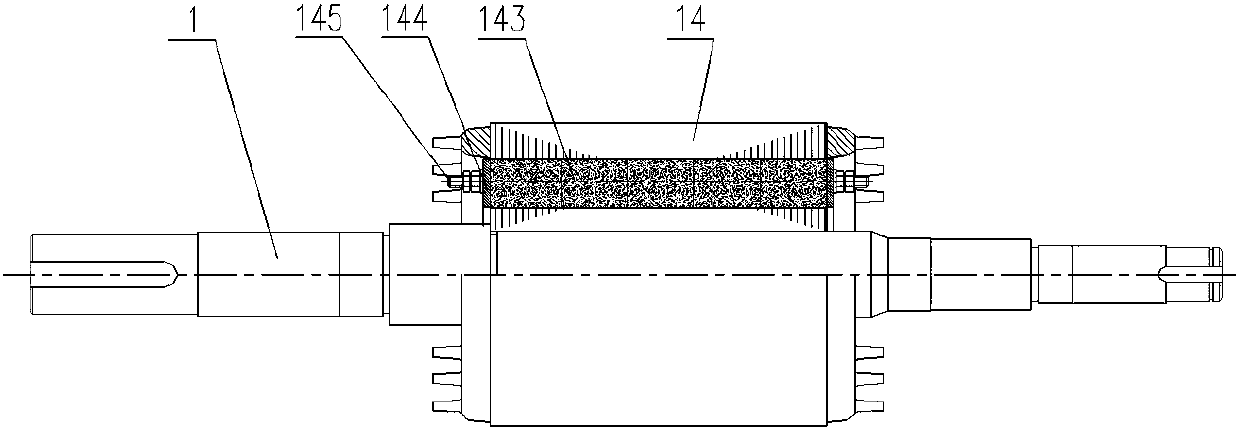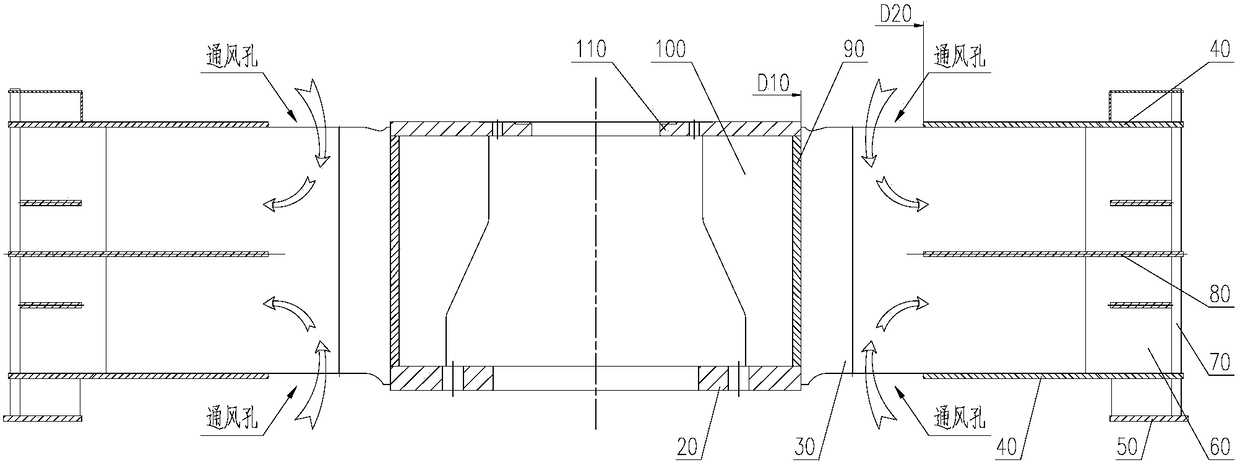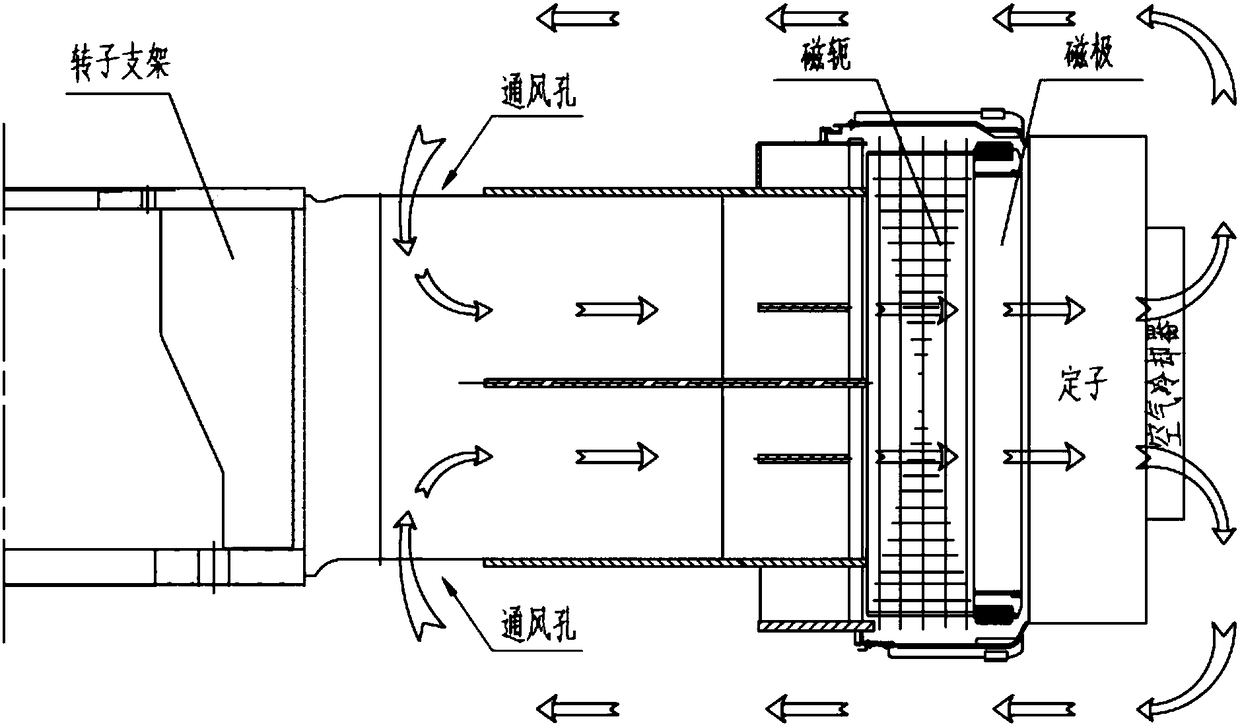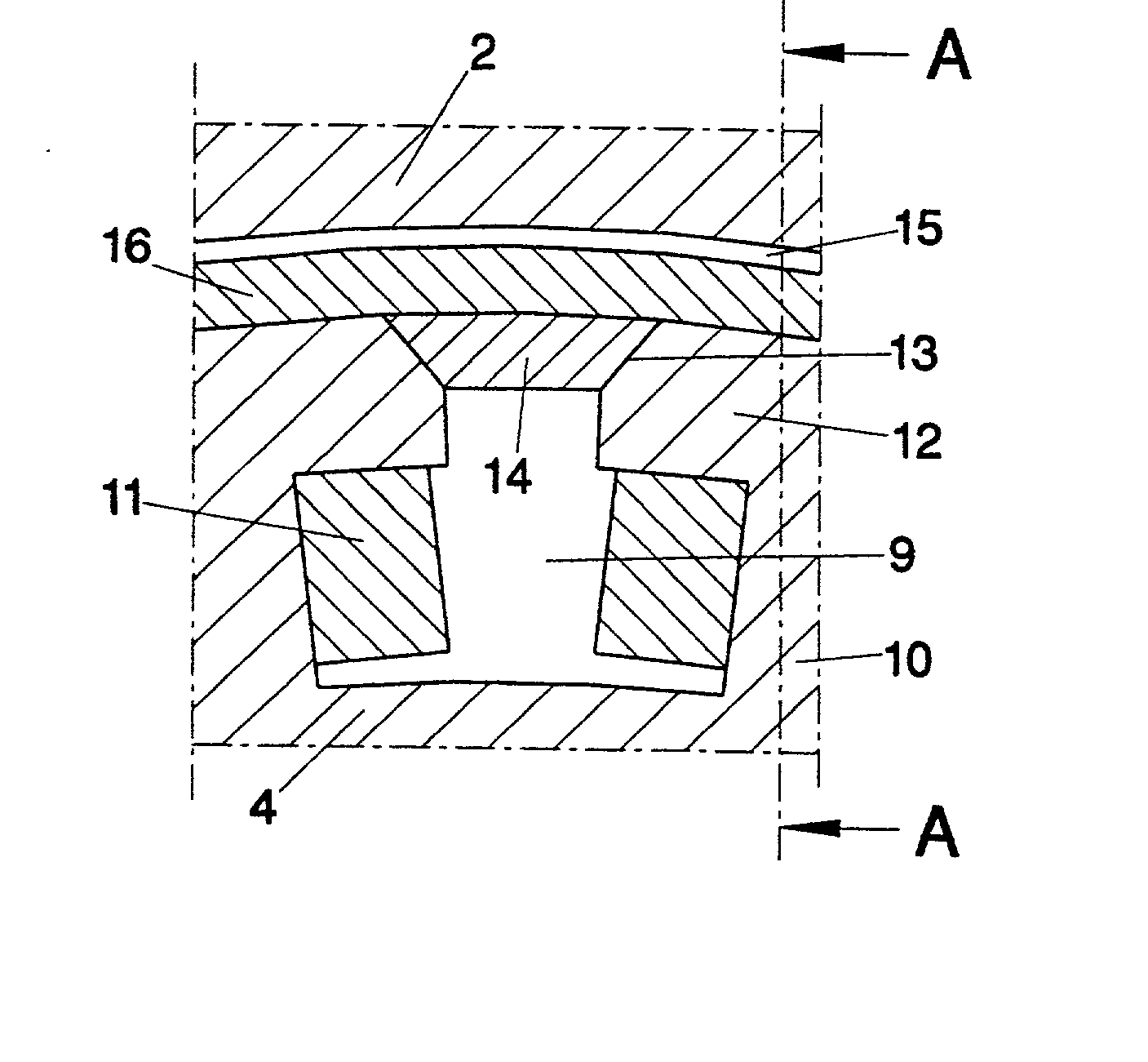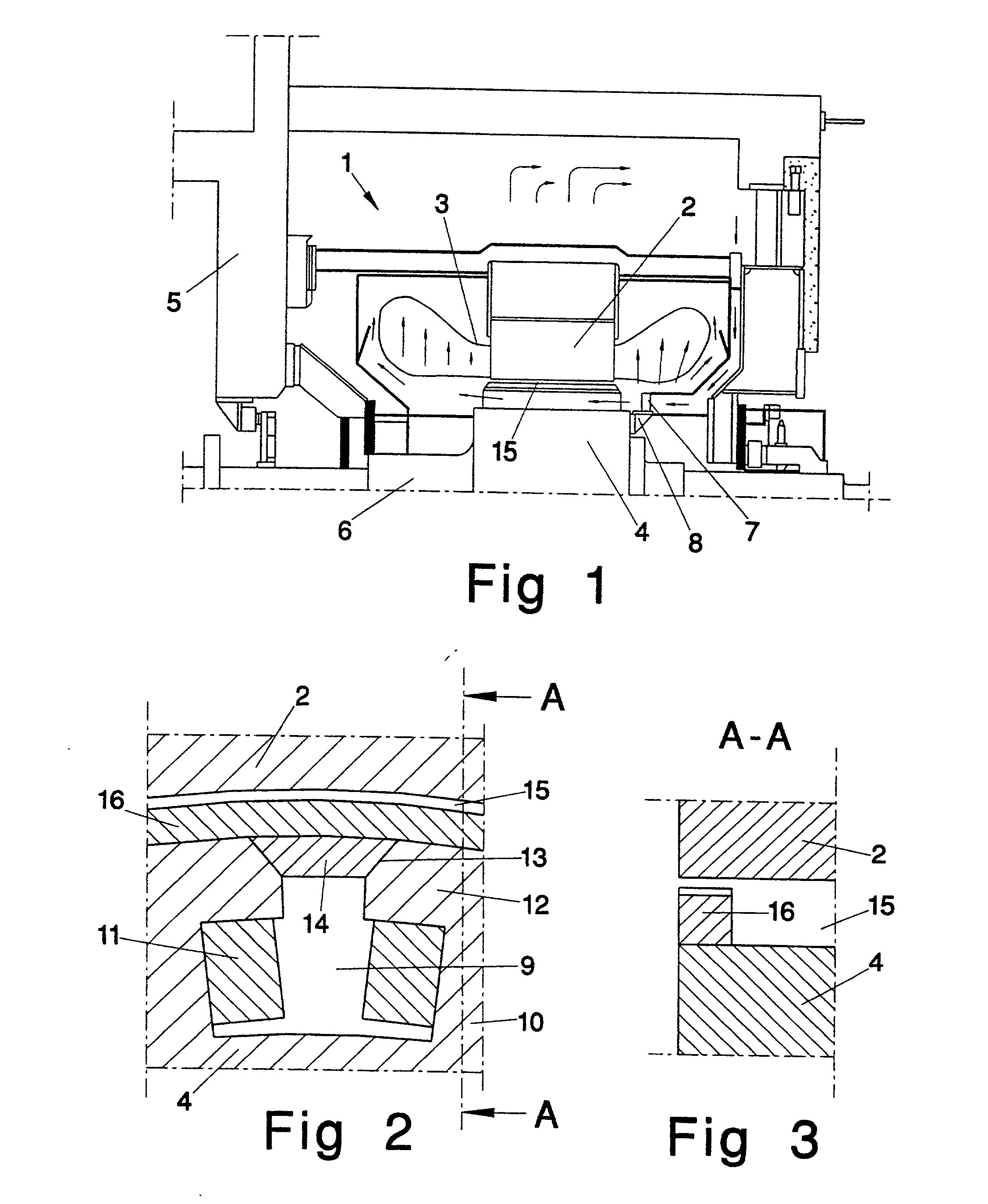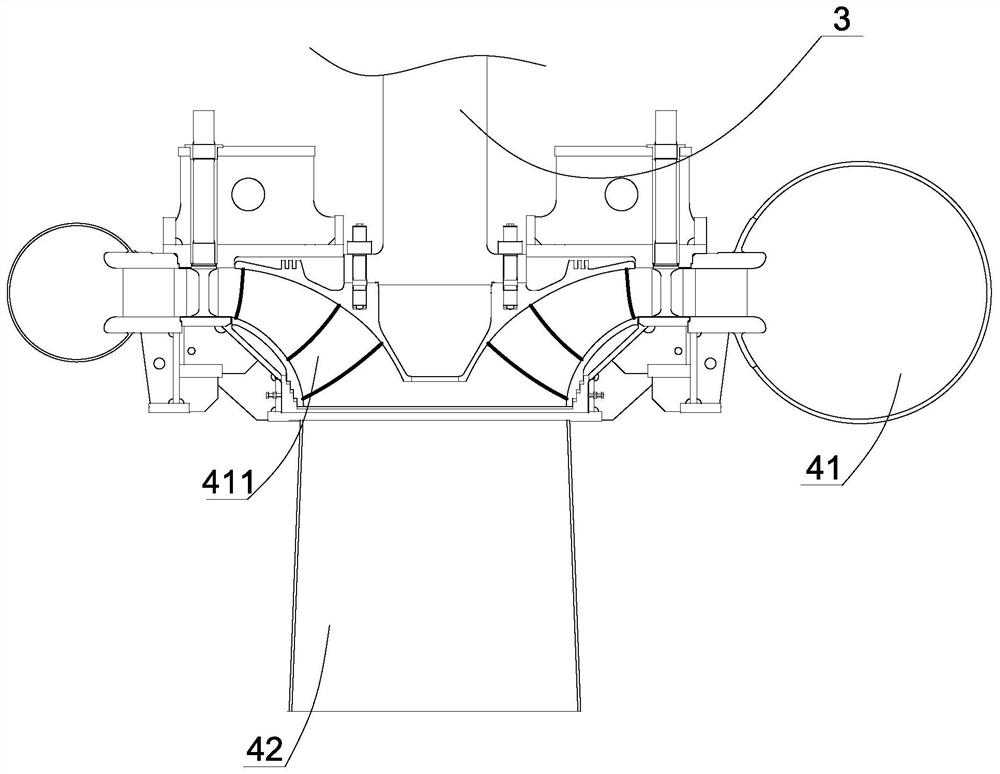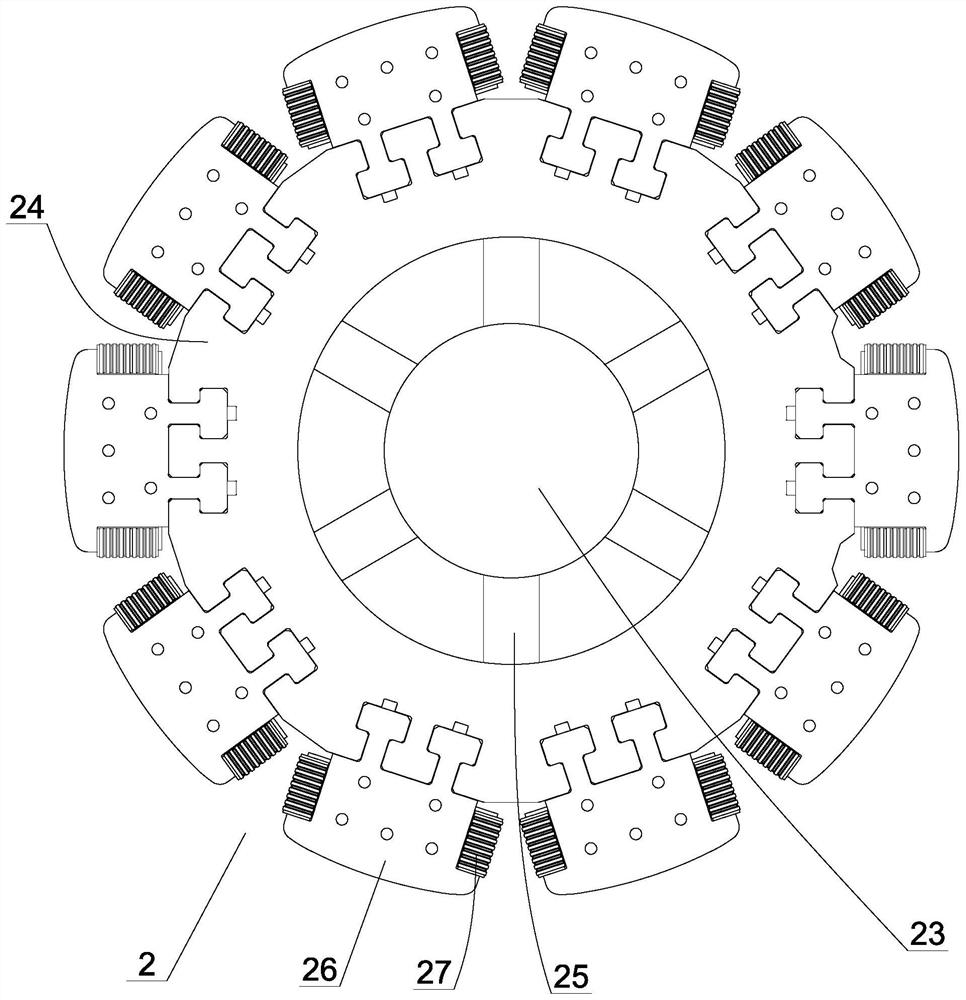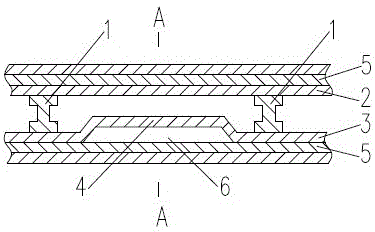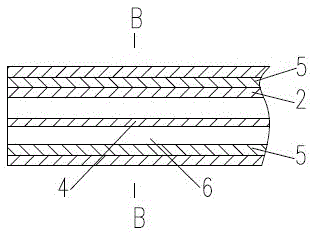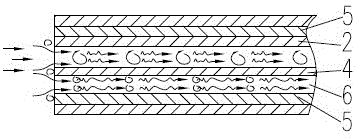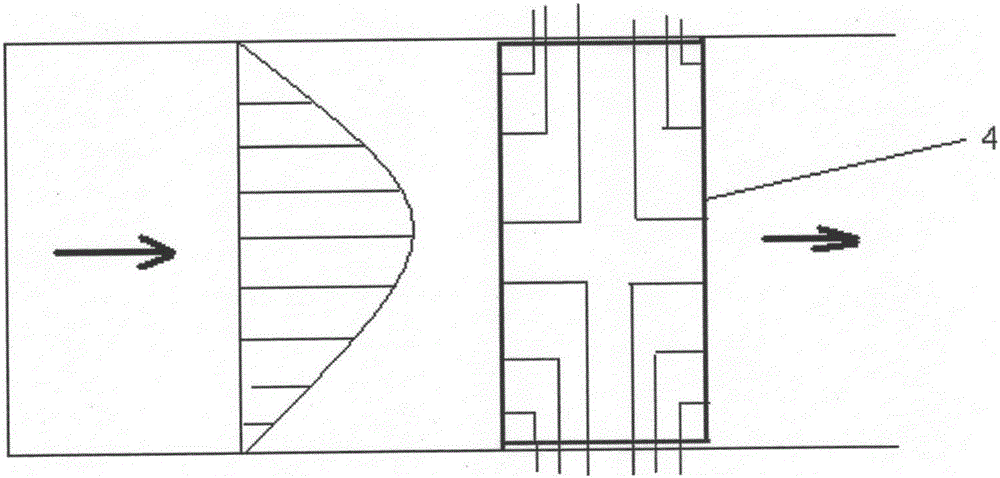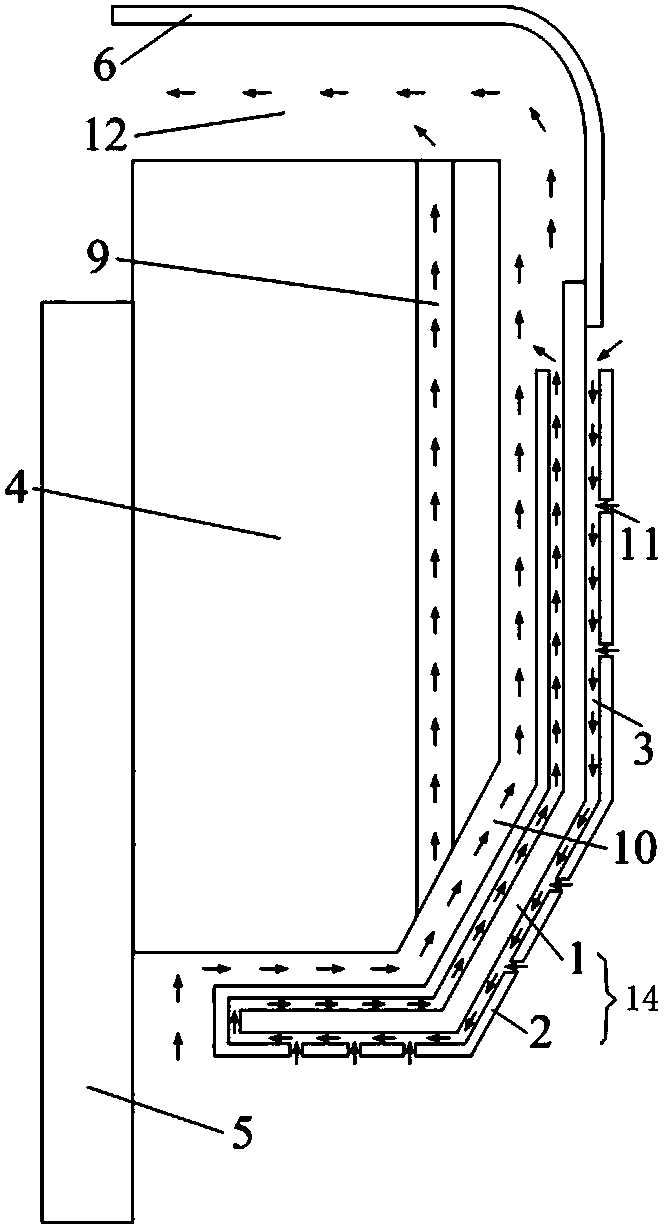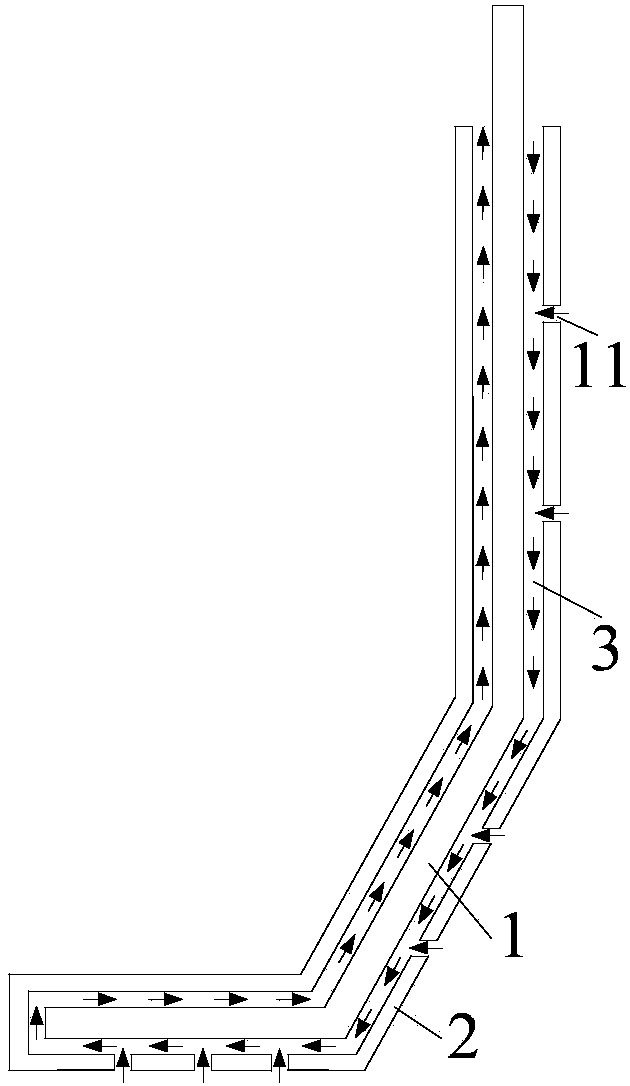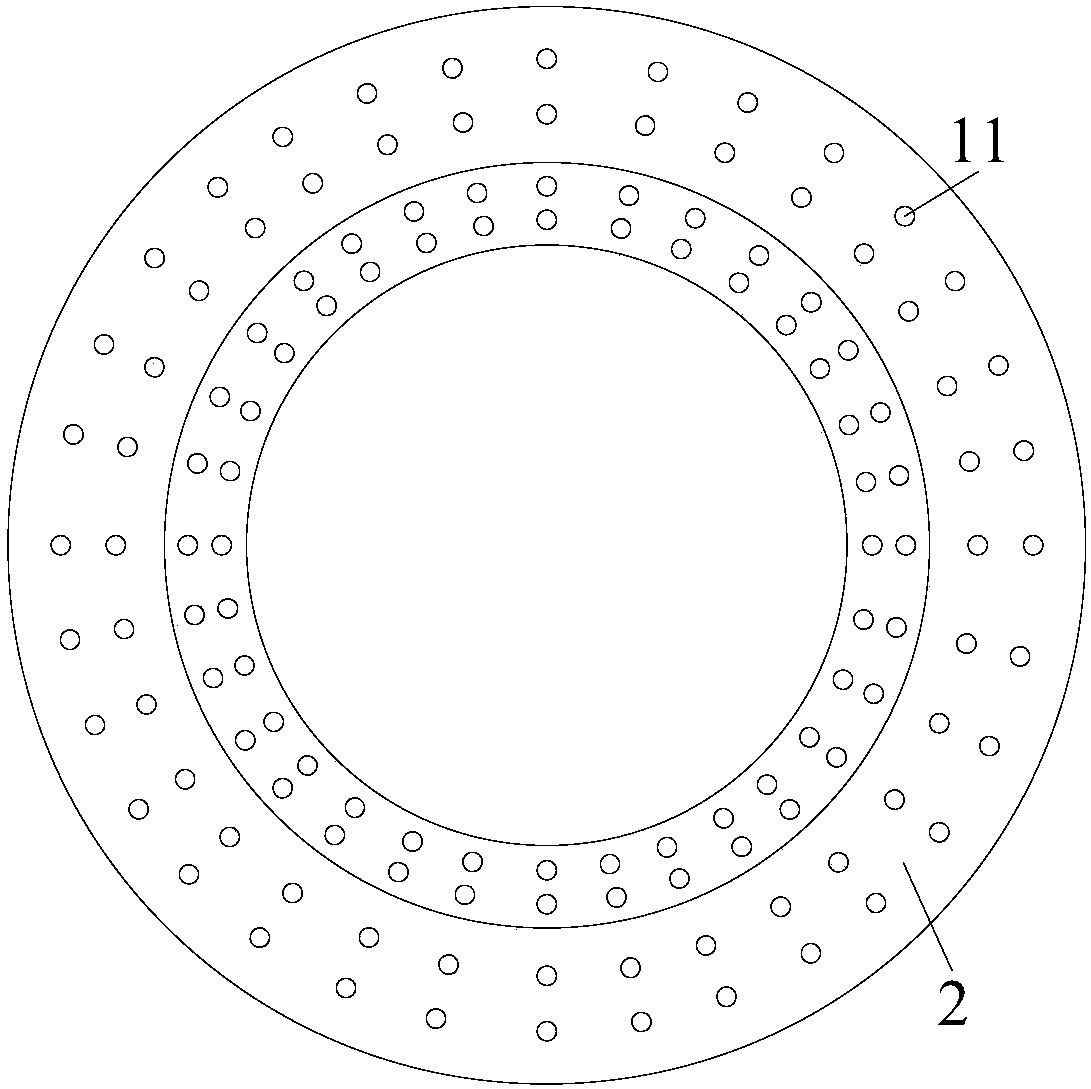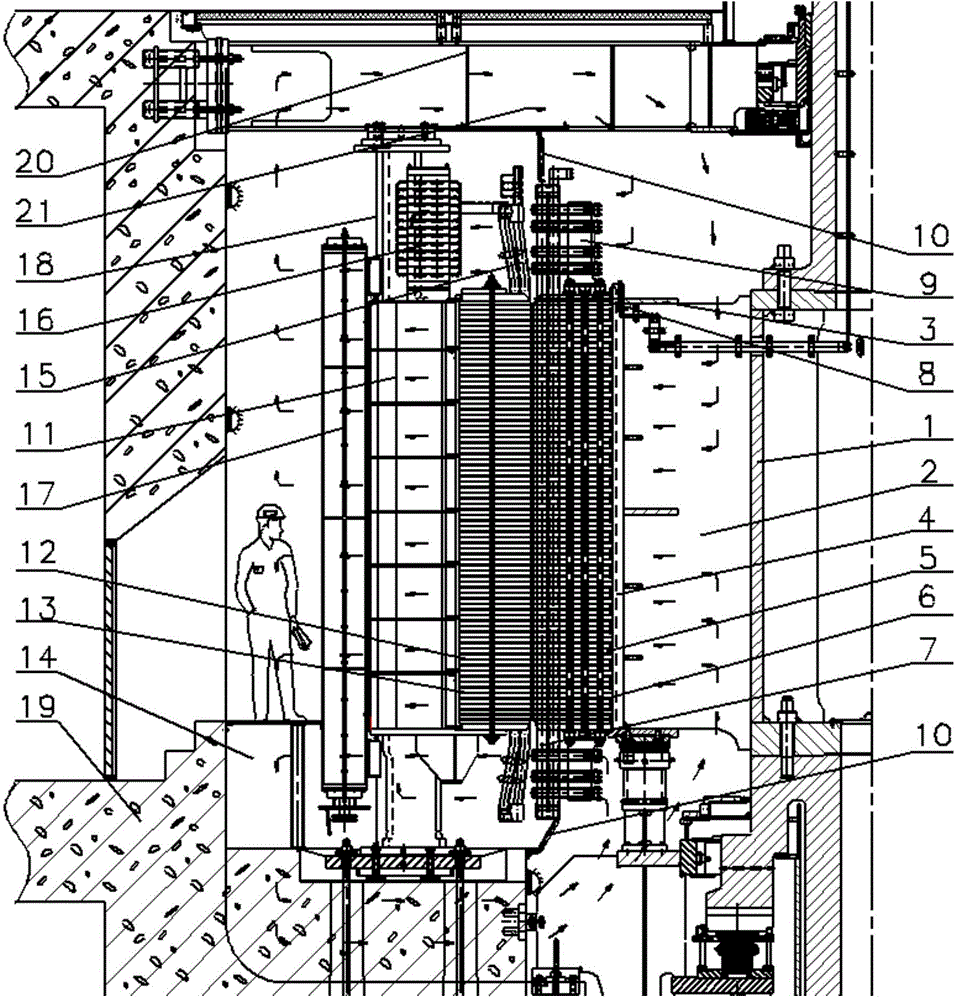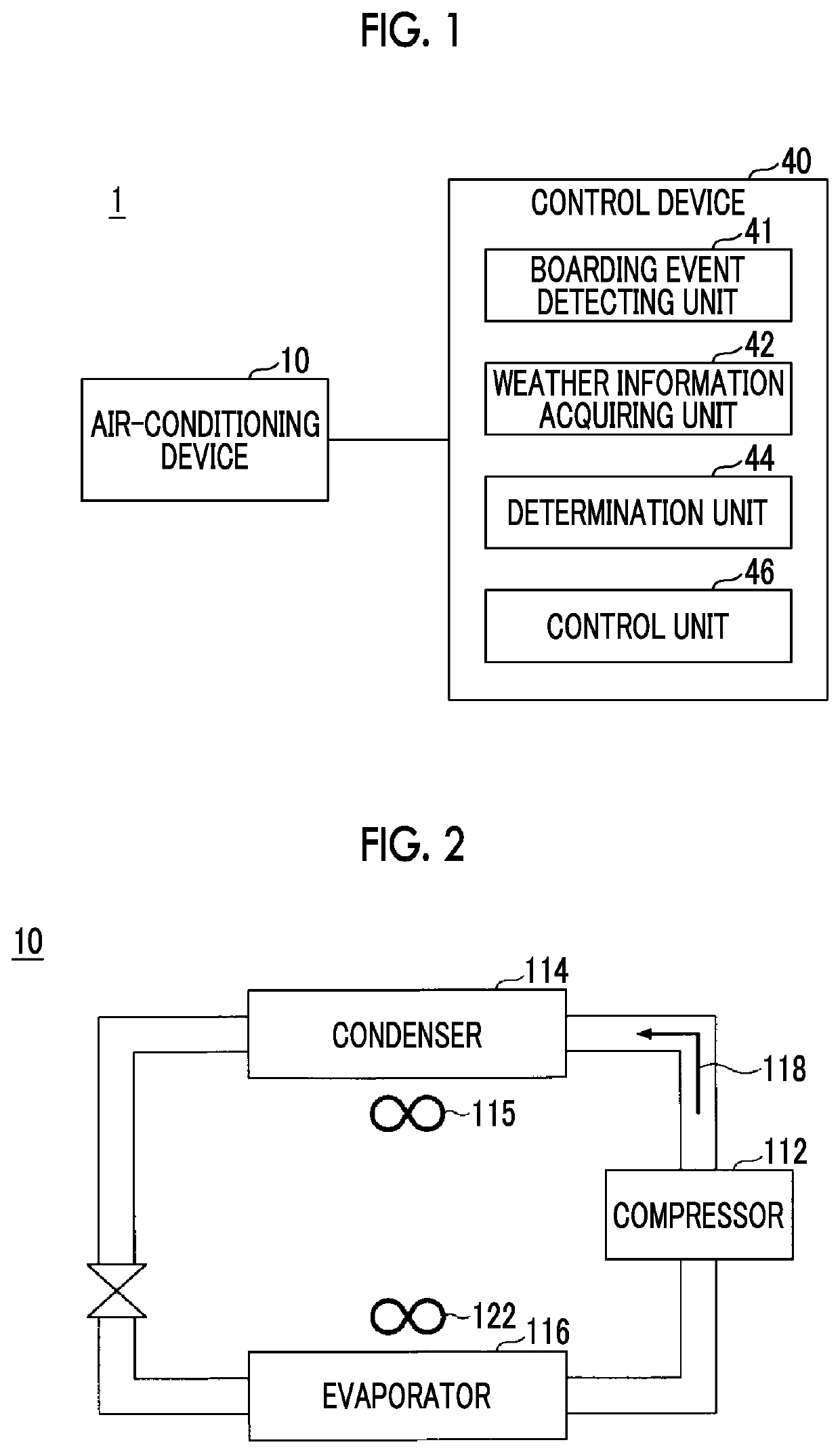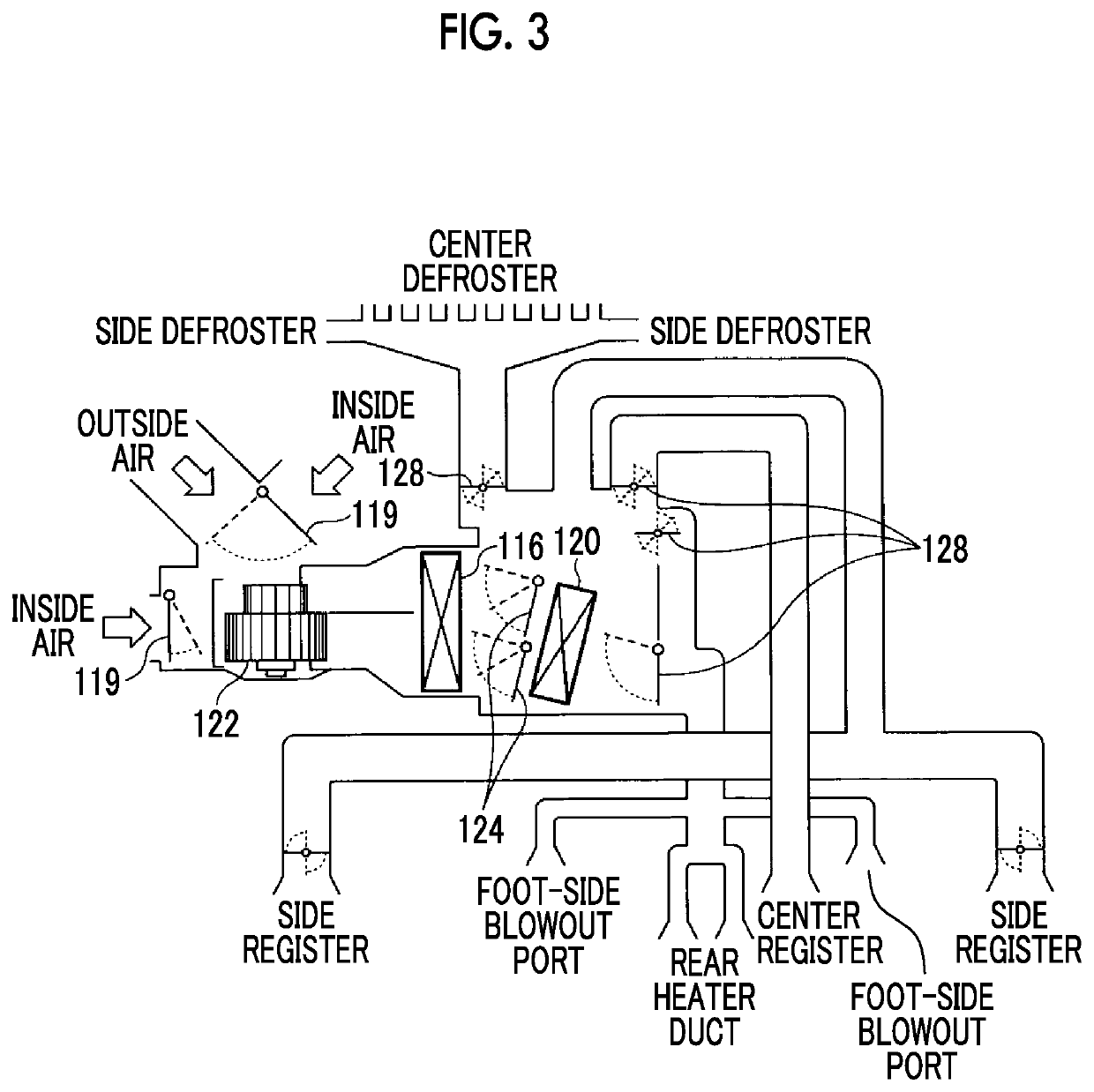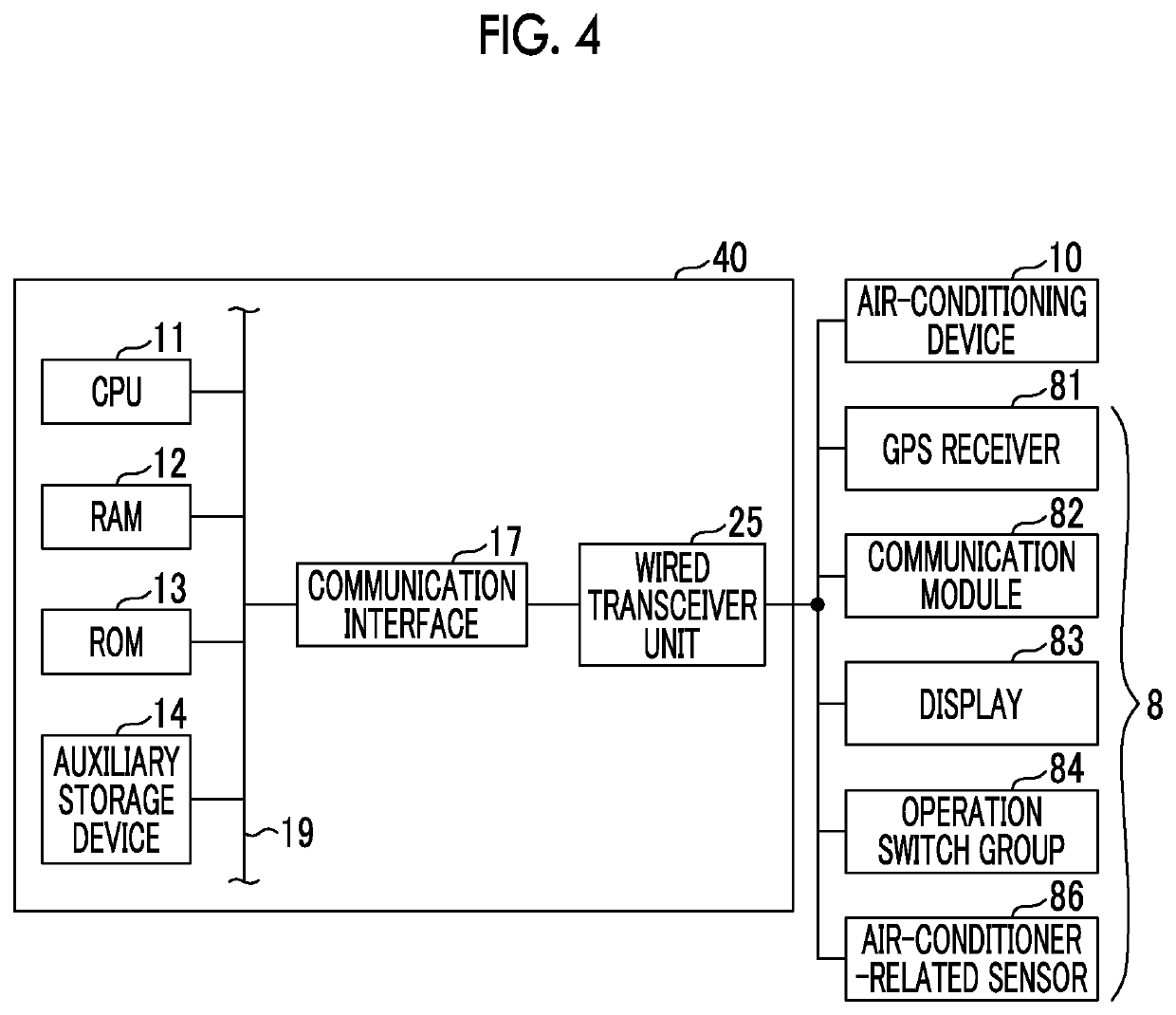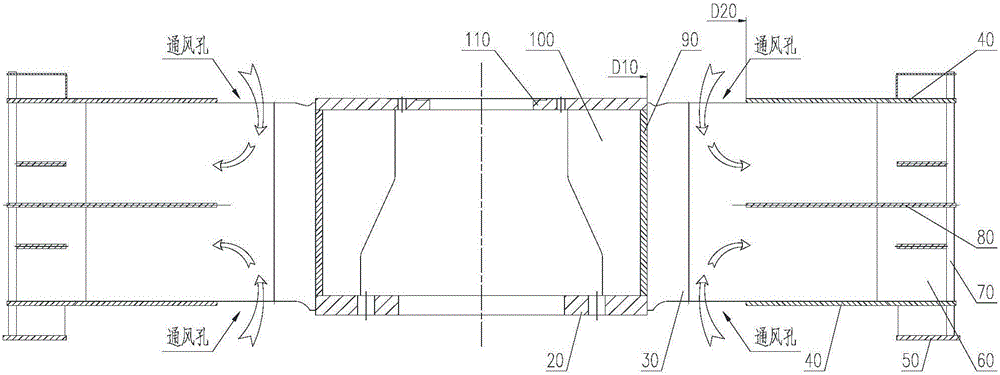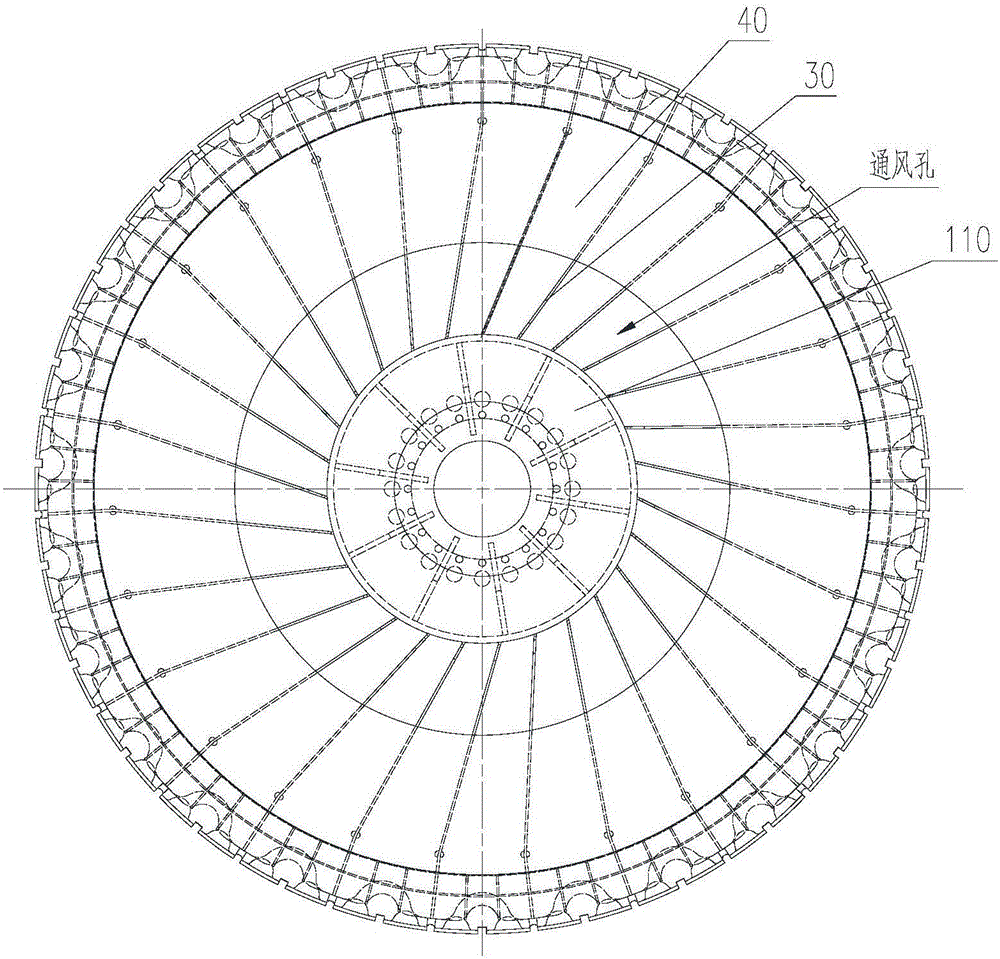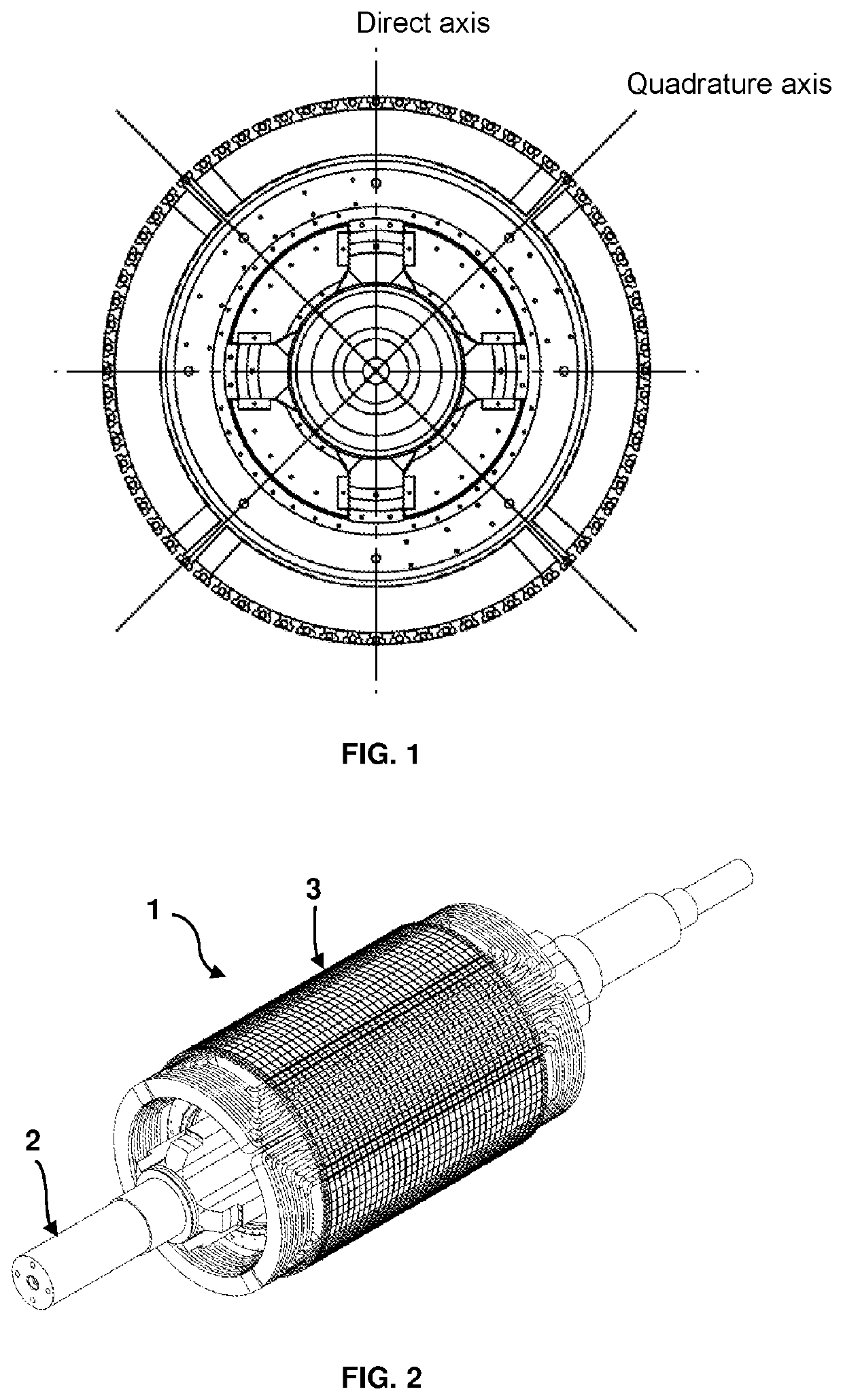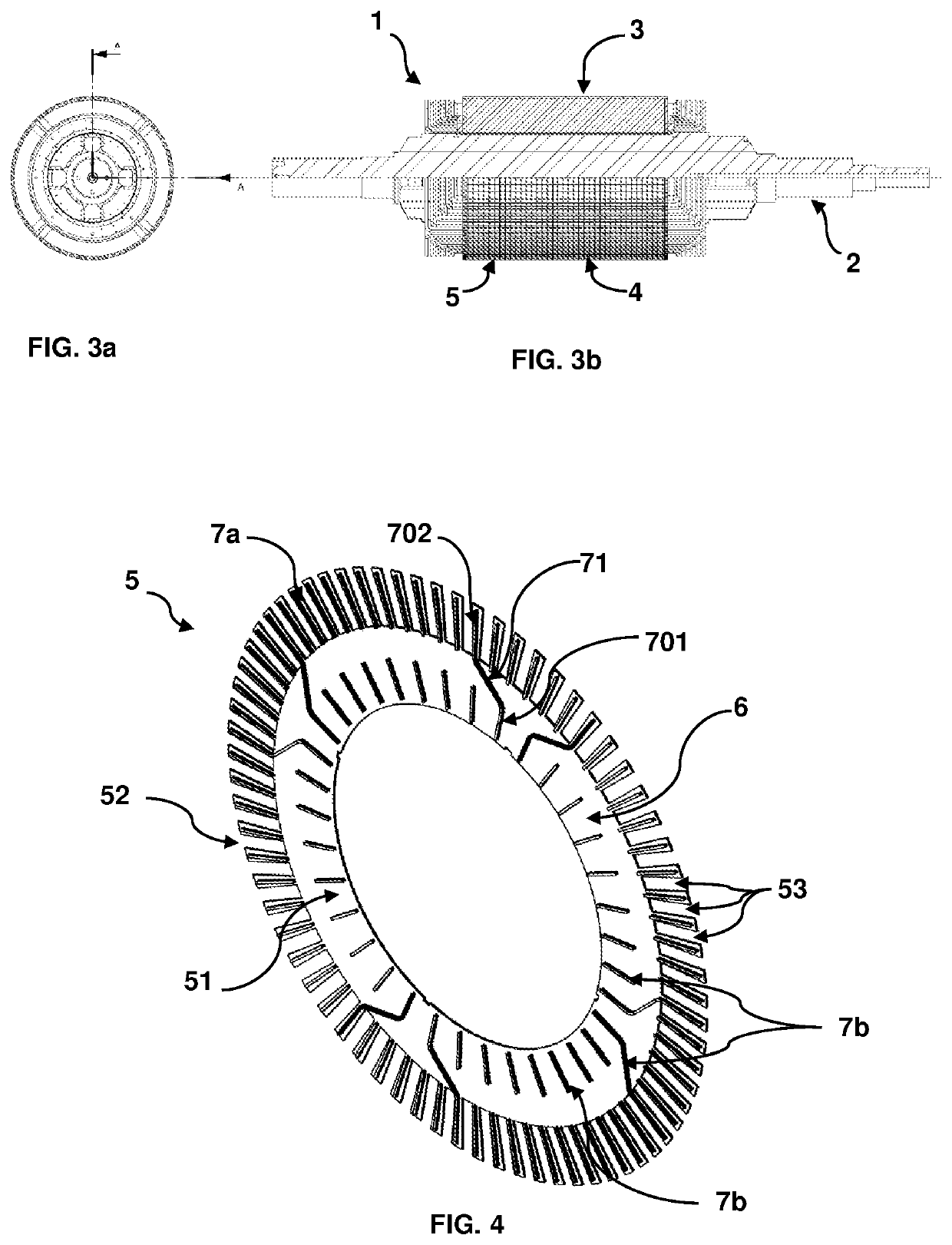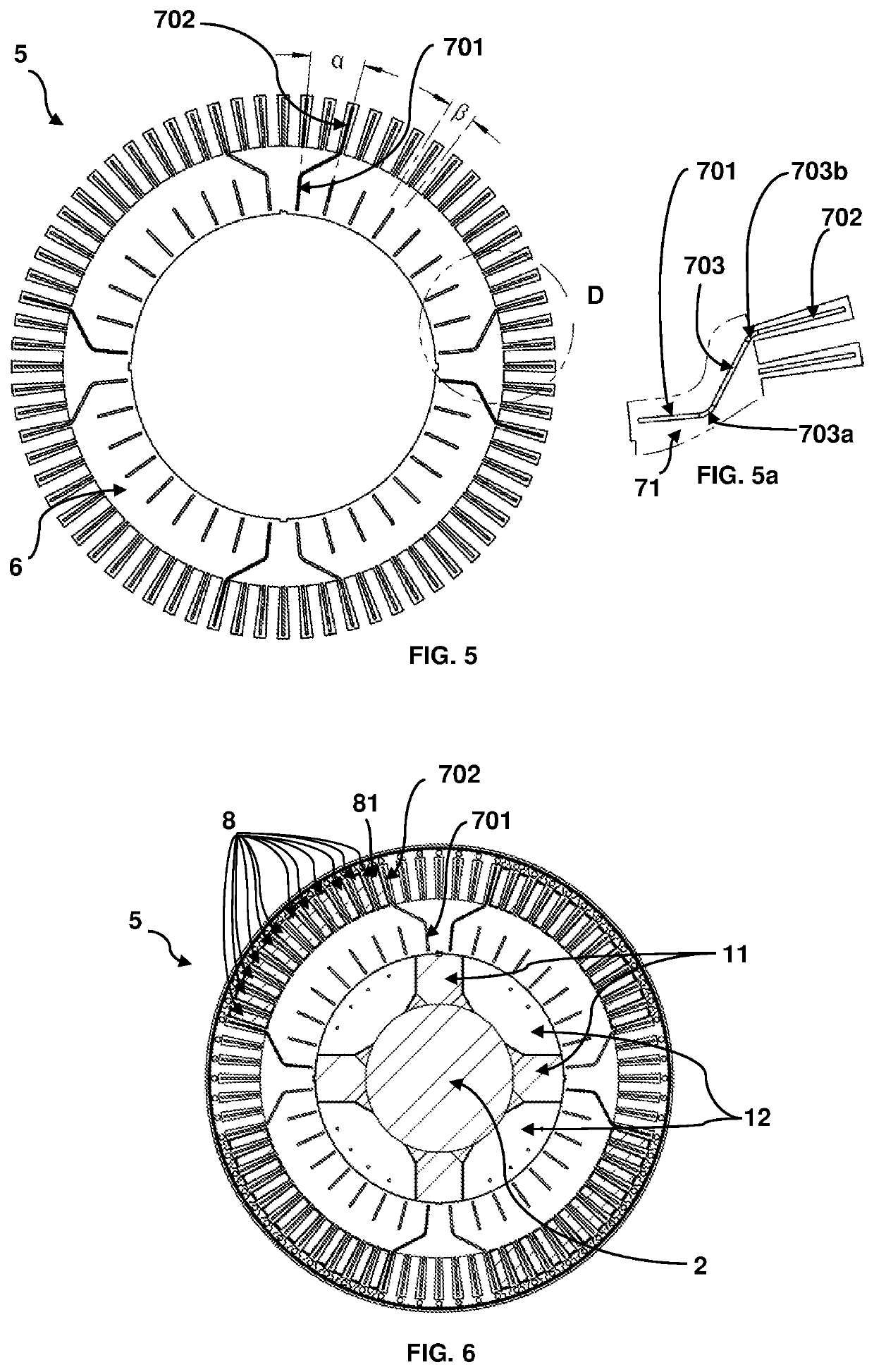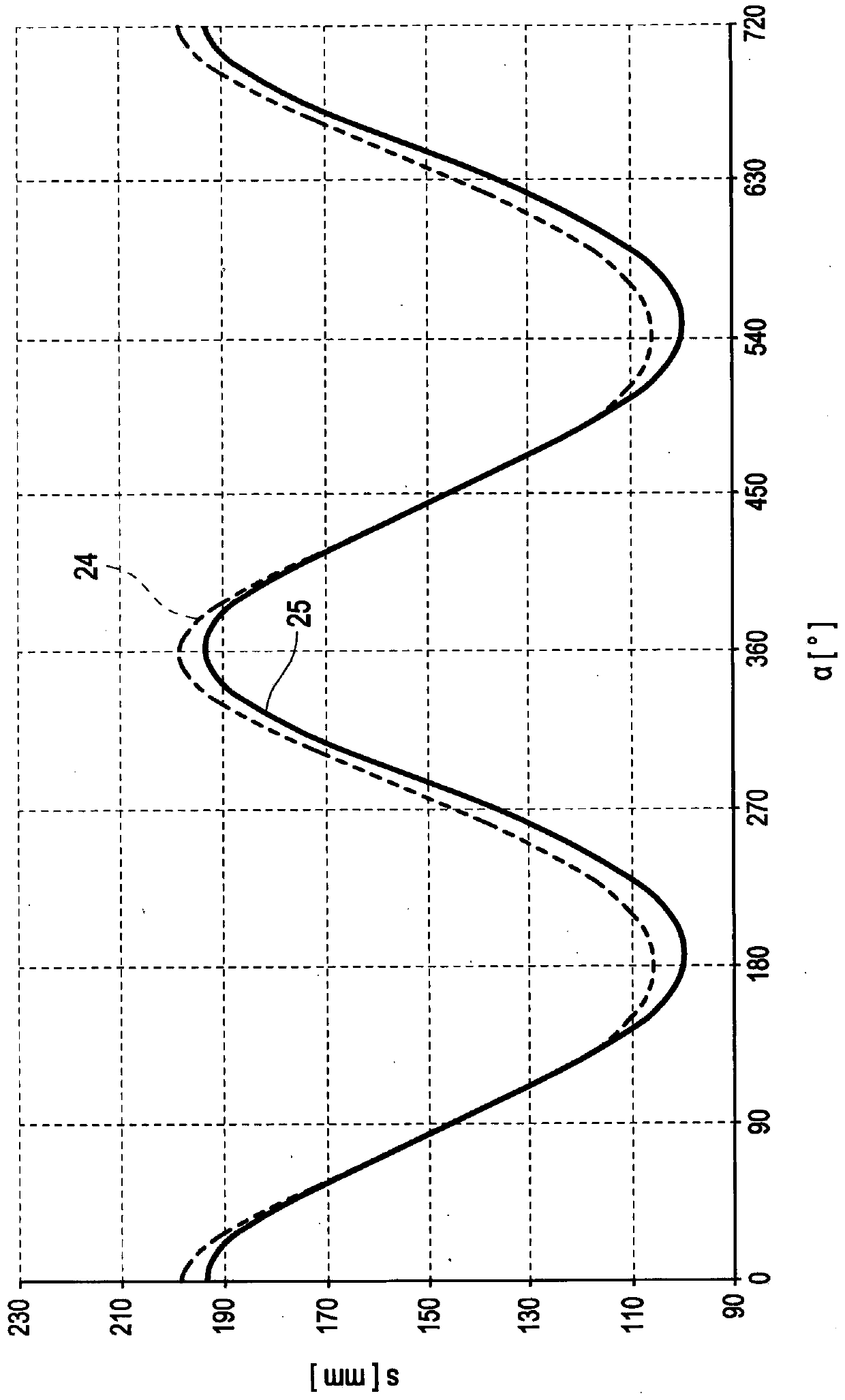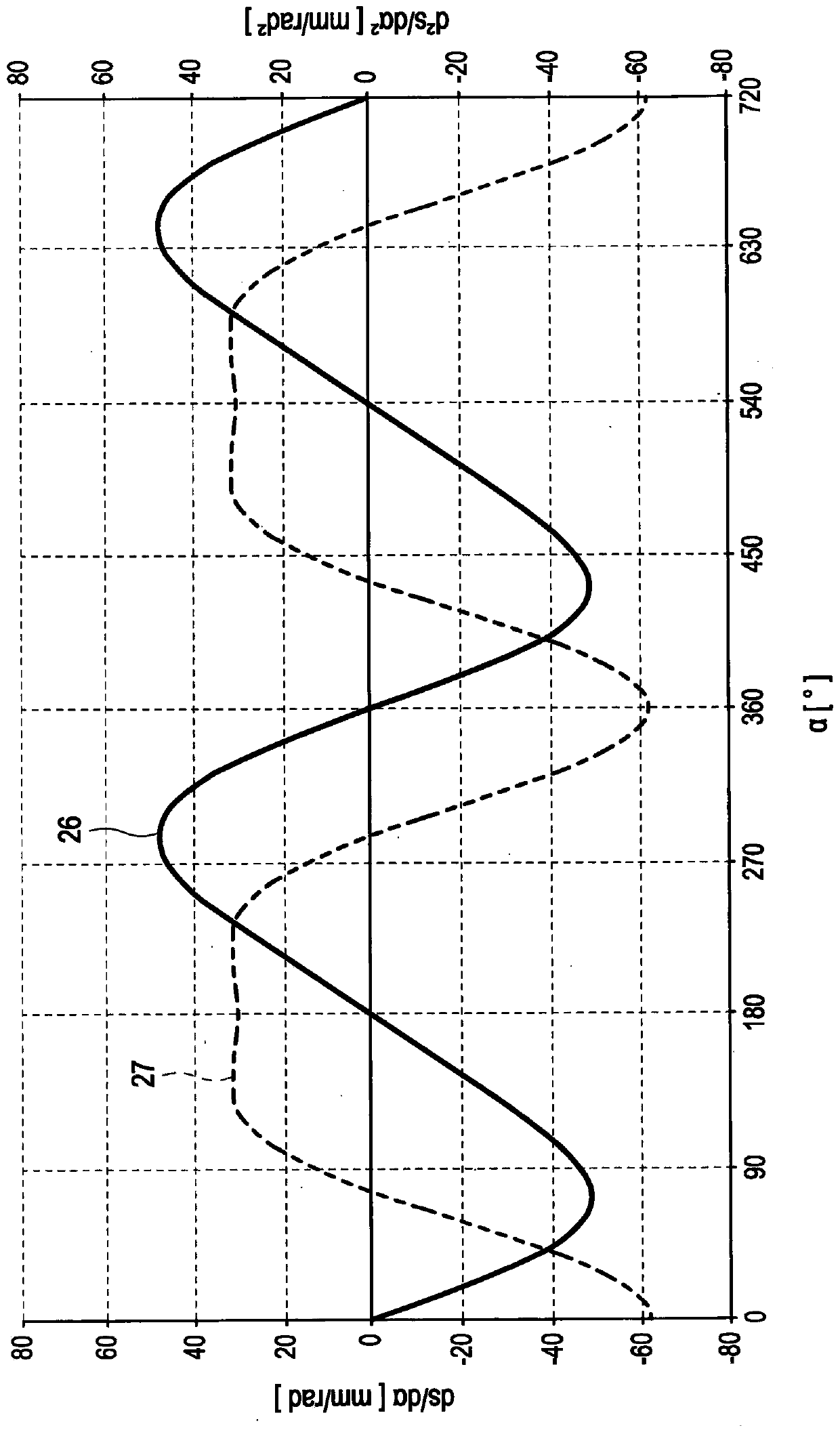Patents
Literature
Hiro is an intelligent assistant for R&D personnel, combined with Patent DNA, to facilitate innovative research.
36results about How to "Reduce ventilation loss" patented technology
Efficacy Topic
Property
Owner
Technical Advancement
Application Domain
Technology Topic
Technology Field Word
Patent Country/Region
Patent Type
Patent Status
Application Year
Inventor
Overflowing fanning strip for strengthening cooling of motor stator
InactiveCN104617690AIncrease the lengthStable supportMagnetic circuit stationary partsElectrical and Electronics engineeringEconomic benefits
The invention relates to an overflowing fanning strip for strengthening cooling of a motor stator. The novel overflowing fanning strip is arranged between stator core sections in a whole-circle way to form a stator ventilation channel, and fluid flowing through the stator ventilation channel can cool a stator coil and a stator core. The ventilation channel forms a plurality of overflowing areas with alternate compression and expansion at a tooth part through broken line overflowing channel steel. Local fluid whirl generated in the overflowing areas is utilized to strengthen the cooling effect of the stator coil and the stator core, the fluid can take away more consumed heat, and the temperature of each heating component is reduced. In addition, the broken line overflowing channel steel enables the wind resistance of the ventilation channel to be higher, so that the total wind volume declines, the ventilation consumption is reduced, and the efficiency of a motor is improved. Through improvement of the cooling effect, the cooling demand of the motor can be met greatly, and greater economic benefits are brought to users through the efficiency improvement.
Owner:HARBIN ELECTRIC MASCH CO LTD
System for mixing cabin air and outside air of air-conditioner for vehicle and method of controlling the same
InactiveUS20150017899A1Reduce ventilation lossAir-treating devicesRailway heating/coolingEngineeringControl unit
A system and a method for mixing cabin and outside air of a vehicle air-conditioner may include a housing having cabin and outside air inlets for ventilating the cabin and outside air, a first door part to selectively cover at least a portion of the cabin air inlet and / or a portion of the outside air inlet to adjust an open value of each of the inlets, a second door part to selectively cover the remaining portion of the outside air inlet to adjust the open value of the outside air inlet, a cam part rotatable in the housing and formed with first and second slots to which the first and second door parts are slidably coupled such that rotation angle of the first or the second door part is varied according to rotation of the cam part, and a controlling unit controlling the rotation of the cam part.
Owner:KIA MOTORS CORP +1
Air-conditioning control system and information processing device
ActiveUS20170368906A1Improve ventilationImprove ventilation capacityAir-treating devicesIndication of weather conditions using multiple variablesInformation processingControl system
An air-conditioning control system includes: an air-conditioning device; and a control device configured to: acquire weather information; detect a boarding event; determine whether an amount of moisture brought in due to an external environment of a vehicle, which is an amount of moisture brought into the vehicle by the occupant at the time of the boarding event, is greater than a predetermined level on the basis of the weather information when a boarding event is detected by the boarding event detecting unit; and change the control information to a second state when it is determined that the amount of moisture brought in while the control information indicates a first state is greater than the predetermined level; control the air-conditioning device; and set a ventilation capacity of the air-conditioning device to be higher when the control information indicates the second state than when the control information indicates the first state.
Owner:TOYOTA JIDOSHA KK
Vehicle Air-Conditioning Related Technique Having Refrigeration Cycle of Supercritical Refrigerant
InactiveUS20070209779A1Reduce ventilation lossAir-treating devicesRailway heating/coolingEngineeringAir conditioning
A vehicle air-conditioning apparatus in which supercritical refrigerant passing through a refrigerant heat releasing passage of a heat releasing device exchanges heat with refrigerant cooling air introduced from an air introduction surface of a heat releasing device to be cooled, and the cooled refrigerant exchanges heat with air to be introduced into a passenger compartment by an evaporator. Since at least a part of discharge air discharged from an inside of a passenger compartment is introduced from an air introduction surface of the heat releasing device as a ventilation loss utilizing air, ventilation loss utilizing air can be used as a part of refrigerant cooling air. The ventilation loss utilizing air is introduced to the downstream side area of the refrigerant heat releasing passage in an air introduction surface of the heat releasing device.
Owner:SHOWA DENKO KK
Turbine for an exhaust gas turbocharger
ActiveUS20140003910A1Easy to operateImprove efficiencyInternal combustion piston enginesPump componentsImpellerTurbine wheel
In a turbine for an exhaust gas turbocharger having a turbine housing which has a first and a second spiral channel with the second spiral channel extending over a wrap angle range of less than 360 degrees of a turbine wheel of the turbine, and the first spiral channel having a larger wrap angle range than the second spiral channel and the spiral channels being arranged adjacent each other in at least one angular range which includes the wrap angle ranges, the nozzle has an overall nozzle width via which exhaust gas is admitted to the turbine wheel over a respective partial nozzle width of the spiral channels wherein the partial nozzle width of the first spiral channel is greater than the partial nozzle width of the first spiral channel in the first angular range, at least in a further angular range of the wrap angle range which is different from the at least one angular range.
Owner:IHI CHARGING SYST INT
Exhaust apparatus of air-cooled fuel cell vehicle
ActiveUS8824876B2Passage sectional areaReduce ventilation lossOhmic-resistance heatingWater heatersFuel cellsAerospace engineering
An exhaust apparatus includes a lower side exhaust duct and an upper side exhaust duct which are branched vertically, and in that the lower side exhaust duct is extended toward the lower side of the vehicle from an exhaust outlet portion of the air-cooled fuel cell stack, and the downstream end portion of the lower side exhaust duct is opened at a lower portion of the front compartment, while the upper side exhaust duct is extended toward the upper side of the vehicle from an upper portion of an outer wall of the lower side exhaust duct, the outer wall extending toward the lower side of the vehicle, and the downstream end portion of the upper side exhaust duct is opened between the rear end portion of the front hood and the front end portion of the front window.
Owner:SUZUKI MOTOR CORP
Exhaust apparatus of air-cooled fuel cell vehicle
ActiveUS20130094842A1Reduce ventilation lossReduce distanceFuel cell heat exchangeOhmic-resistance heatingFuel cellsAerospace engineering
An exhaust apparatus includes a lower side exhaust duct and an upper side exhaust duct which are branched vertically, and in that the lower side exhaust duct is extended toward the lower side of the vehicle from an exhaust outlet portion of the air-cooled fuel cell stack, and the downstream end portion of the lower side exhaust duct is opened at a lower portion of the front compartment, while the upper side exhaust duct is extended toward the upper side of the vehicle from an upper portion of an outer wall of the lower side exhaust duct, the outer wall extending toward the lower side of the vehicle, and the downstream end portion of the upper side exhaust duct is opened between the rear end portion of the front hood and the front end portion of the front window.
Owner:SUZUKI MOTOR CORP
Vehicle air-conditioning related technique having refrigetation cycle of supercritical refrigerant
InactiveCN1914054ARealize the function/effectEnough heatAir-treating devicesCompression machines with non-reversible cycleEngineeringAir conditioning
The invention is directed to a vehicle air-conditioning apparatus in which supercritical refrigerant passing through a refrigerant heat releasing passage P of a heat releasing device 2 exchanges heat with refrigerant cooling air introduced from an air introduction surface F of a heat releasing device 2 to be cooled, and the cooled refrigerant exchanges heat with air to be introduced into a passenger compartment by an evaporator 5. Since at least a part of discharge air discharged from an inside of a passenger compartment is introduced from an air introduction surface F of the heat releasing device 2 as a ventilation loss utilizing air, ventilation loss utilizing air can be used as a part of refrigerant cooling air. It is constituted such that the ventilation loss utilizing air is introduced to the downstream side area f of the refrigerant heat releasing passage P in an air introduction surface F of the heat releasing device 2. Thus, in a vehicle air-conditioning apparatus having a supercritical refrigerant refrigeration cycle, ventilation loss can be reduced while improving refrigeration performance.
Owner:SHOWA DENKO KK
Method for district cooling of internal cooling and external cooling of rotor magnetic pole
ActiveCN103715803ALow ventilation resistanceReduce ventilation lossMagnetic circuit rotating partsEngineeringElectrical and Electronics engineering
The invention discloses a method for district cooling of internal cooling and external cooling of a rotor magnetic pole. A cooling gas flows into a channel between two magnetic pole coils through a ventilating partitioning device on air inlet ends of the two magnetic pole coils to form an external cooling ventilating air path for cooling the external part of the magnetic pole coils, flows into the interiors of the magnetic pole coils through a gap between magnetic pole iron cores and magnetic pole coils to form an internal cooling ventilating air path for cooling the interiors of the magnetic pole coils, and finally flows into the channels between the two magnetic pole coils from the interiors of the magnetic pole coils, so that the ventilating partitioning device is used for mutually separating the external cooling ventilating path from the internal cooling ventilating path which flow in the channel. According to the method, through simultaneously performing internal cooling and external cooling on the magnetic pole coils, and separating the internal cooling ventilating air path and the external cooling ventilating air path in the channel between the two magnetic pole coils, the internal cooling ventilating air path and the external cooling ventilating air path are in mutual noninterference, the cooling gas ventilating inside smoothly flows in the channel between the two magnetic pole coils, and thus the cooling effect of the whole magnetic pole is improved.
Owner:STATE GRID XINYUAN +1
Turbine for an exhaust gas turbocharger
ActiveUS9399923B2Improve turbine efficiencyLow efficiencyInternal combustion piston enginesPump componentsImpellerTurbine wheel
In a turbine for an exhaust gas turbocharger having a turbine housing which has a first and a second spiral channel with the second spiral channel extending over a wrap angle range of less than 360 degrees of a turbine wheel of the turbine, and the first spiral channel having a larger wrap angle range than the second spiral channel and the spiral channels being arranged adjacent each other in at least one angular range which includes the wrap angle ranges, the nozzle has an overall nozzle width via which exhaust gas is admitted to the turbine wheel over a respective partial nozzle width of the spiral channels wherein the partial nozzle width of the first spiral channel is greater than the partial nozzle width of the first spiral channel in the first angular range, at least in a further angular range of the wrap angle range which is different from the at least one angular range.
Owner:IHI CHARGING SYST INT
Control method of heat dissipation system of high-capacity generator set
ActiveCN111654158AEven heat dissipationReduce ventilationMagnetic circuit rotating partsMagnetic circuit stationary partsCold airThermodynamics
The invention discloses a control method of a heat dissipation system of a high-capacity generator set. The method comprises the following steps: when a rotating wheel drives a rotor to rotate to generate electricity, a rotating shaft on the rotor driving centrifugal fan blades to rotate, so that cold air at the air inlet end is sucked in, flows out in the radial direction through vent holes in amagnet yoke, is sprayed to a stator to absorb heat to become hot air, and is exhausted outwards through the air outlet end; detecting a temperature difference delta T between the air outlet end and the air inlet end, and comparing the temperature difference -T with a set temperature difference delta T; when -T is less than or equal to 0.95[delta]T, reducing the friction force between the rotatingshaft and the centrifugal fan blades to reduce rotating speed of the centrifugal fan blades, and when -T is larger than or equal to 1.05 [delta T, increasing the friction force between the rotating shaft and the centrifugal fan blades to increase the rotating speed of the centrifugal fan blades, and when -T is larger than or equal to 0.95 [delta]T and smaller than 1.05 [delta]T, keeping the friction force unchanged. Ventilation loss can be remarkably reduced, the heat dissipation and cooling efficiency is improved, uniform heat dissipation of the generator set is ensured, and the complex structure of a heat dissipation system is avoided.
Owner:浙江富春江水电设备有限公司
Efficient heat dissipation system for pole coil of hydro-generator
ActiveCN111654163AReduce weightFast heat transferMagnetic circuit rotating partsMagnetic circuit stationary partsThermodynamicsMagnetic poles
The invention discloses an efficient heat dissipation system for a pole coil of a hydro-generator. The system comprises a stator, a rotor and a cooling system. The rotor comprises a rotating shaft, amagnet yoke, a bracket for connecting the rotating shaft and the magnet yoke, a plurality of iron cores, and a plurality of layers of copper bars arranged on the iron cores. The magnet yoke, the ironcore and the stator are respectively provided with a plurality of radial ventilation holes. The middle part of the outer side of the stator is an air outlet end. The cooling system is connected with the air inlet end and the air outlet end through pipelines. A ventilation turn is arranged between every two adjacent layers of copper bars, axial ventilation holes which extend in the axial directionof the rotor and penetrate through the air inlet ends of the two ends are formed in the ventilation turns, a plurality of radial heat dissipation holes which penetrate through the axial ventilation holes are formed in the outer sides of the ventilation turns, and the areas of the radial heat dissipation holes are gradually increased from the two ends of the rotor to the middle of the rotor. According to the invention, the heat dissipation effect of the rotor magnetic pole can be effectively improved, the ventilation loss is reduced, the heat dissipation and cooling efficiency is improved, andthe complex structure of a heat dissipation system can be avoided.
Owner:浙江富春江水电设备有限公司
Wind driven generator
ActiveCN102332780BImprove work efficiencySmall sizeMagnetic circuit stationary partsCooling/ventillation arrangementCold airWind driven
Owner:DONGFANG ELECTRIC MACHINERY
Large air-cooled turbo-generator with circumferential mixed ventilation cooling structure
ActiveCN101860119BGuaranteed uptimeIncrease the maximum temperatureCooling/ventillation arrangementCold airAeroshell
The invention relates to a large air-cooled turbo-generator with a circumferential mixed ventilation cooling structure, which belongs to the technical field of motors. The large air-cooled turbo-generator can solve the problem that the existing cooling technology of the turbo-generator and the improvement technology of the single unit capacity can not be simultaneously integrated. The large air-cooled turbo-generator comprises a stator, a rotor and a housing, wherein an air gap is arranged between the surface of an outer circle of the rotor and the surface of an inner circle of the stator, the stator is covered in the housing, the large air-cooled turbo-generator further comprises four axial rubber separators and a cooler, the four axial rubber separators are uniformly arranged between the surface of the inner circle of the housing and the surface of the outer circle of the stator along the circumferential direction, two opposite cold air areas and two opposite hot air areas are formed, and the two opposite hot air areas are communicated with an inlet of the cooler. The large air-cooled turbo-generator with the circumferential mixed ventilation cooling structure is used for cooling the large air-cooled turbo-generator.
Owner:HARBIN UNIV OF SCI & TECH
Multi-joint crank drive of an internal combustion engine and method for operating a multi-joint crank drive
ActiveCN105723071ASmall inertia forceReduce ventilation lossCombustion enginesExpansion phaseEngineering
The invention relates to a multi-joint crank drive (10) of an internal combustion engine (1), comprising a plurality of coupling members (11) rotatably supported on crank pins (6) of a crankshaft (2) and a plurality of articulation connecting rods (15) rotatably supported on crank pins (19) of an eccentric shaft (8), wherein each of the coupling members (11) is pivotably connected to a piston connecting rod (4) of a piston (3) of the internal combustion engine (1) and to one of the articulation connecting rods (15). According to the invention, in order to reduce free mass forces of the second order, the multi-joint crank drive (10) is designed or adjusted in such a way that a crankshaft rotational angle range of an intake phase is greater than 180 degrees; that a crankshaft rotational angle range of a compression phase is less than 180 degrees; that a crankshaft rotational angle range of an expansion phase is greater than 180 degrees; and that a crankshaft rotational angle range of an exhaust phase is less than 180 degrees. The invention further relates to a method for operating a multi-joint crank drive (10) of an internal combustion engine (1).
Owner:AUDI AG
Level-1 energy-efficient flameproof asynchronous starting three-phase permanent magnet synchronous motor
PendingCN109639000AImprove integrityHigh mechanical strengthMagnetic circuit rotating partsCooling/ventillation arrangementPermanent magnet rotorPunching
A level-1 energy-efficient flameproof asynchronous starting three-phase permanent magnet synchronous motor comprises a flameproof shell, a stator component, and a rotating shaft equipped with a permanent magnet rotor component. The stator component is fixed in the flame-proof shell, and includes a stator core and a stator coil. The permanent magnet rotor component includes a rotor core, starting cage bars, steel magnets and a non-magnetic steel magnet pressure plate. The rotor core is formed by stacking rotor punching sheets coaxially and is fixed on the rotating shaft. The rotor punching sheets are provided with a plurality of starting cage bar installation slots and steel magnet slots distributed in a W shape. As the steel magnet slots are distributed in a W shape through a built-in magnetic circuit structure, the flameproof asynchronous starting three-phase permanent magnet synchronous motor has the advantages of both a series rotor structure and a parallel rotor structure, more steel magnets can be installed on the rotor component compared with the series and parallel magnetic circuit structures, the no-load magnetic leakage coefficient is smaller, and the integrity and mechanical strength of the rotor component are improved. The level-1 energy-efficient flameproof asynchronous starting three-phase permanent magnet synchronous motor is applicable to bad working conditions.
Owner:WOLONG ELECTRIC NANYANG EXPLOSION PROTECTION GRP CO LTD +1
Methanol-high-pressure-oxygen compound two-stroke engine and control method thereof
ActiveCN111287847ARealize work cycleReduce power consumptionElectrical controlInternal combustion piston enginesExhaust valveInlet valve
The invention discloses a methanol-high-pressure-oxygen compound two-stroke engine. The methanol-high-pressure-oxygen compound two-stroke engine is composed of one or more air cylinder groups, each air cylinder group comprises a main air cylinder and a corresponding auxiliary air cylinder, and the main air cylinders are provided with starting fuel nozzles, methanol nozzles, oxygen nozzles and mainair cylinder exhaust valves and are not provided with air inlet valves; and connection channels are arranged between main air cylinder exhaust ports and the auxiliary air cylinders, the connection channels are provided with one-way valves at auxiliary air cylinder inlets, air in the main air cylinders only flows into the auxiliary air cylinders through the one-way valves, the auxiliary air cylinders are not provided with fuel nozzles and are provided with auxiliary air cylinder air inlet valves and auxiliary air cylinder exhaust valves, and the auxiliary air cylinder air inlet valves communicate with an engine air inlet pipe. Methanol is injected into the main air cylinders, the amount of oxygen injected in the main air cylinders is controlled, the degree of fuel combustion is controlled,high-temperature active air which is not completely burned in the main air cylinders is introduced into the auxiliary air cylinders to continue combustion, the cylinder-dividing circulation is achieved, the emission of harmful air is reduced, and the full combustion of fuel is achieved.
Owner:ANYANG INST OF TECH
A ventilated adjustable hydraulic turbine generator rotor bracket
ActiveCN105914928BEasy to adjustFlexible damageMagnetic circuit rotating partsEngineeringUltimate tensile strength
The invention discloses a ventilation adjustable hydraulic generator rotor bracket. The ventilation adjustable hydraulic generator rotor bracket comprises an inner central body and an outer central body; the inner central body is composed of a lower flange surface of the inner central body, a cylinder of the inner central body, a rib plate of the inner central body and an upper flange surface of the inner central body in an installing and welding manner; the outer central body is composed of an inner wind-blocking annular plate, a cylinder of the outer central body and a rib plate of the outer central body in an installing and welding manner; the inner wind-blocking annular plate, the lower flange surface of the inner central body and the upper flange surface of the inner central body are in splice welding; an inclined web plate and a straight web plate are arranged outside the cylinder of the outer central body; an outer annular plate and a middle annular plate are welded on the straight web plate; the parts of the outer annular plate and the middle annular plate extending out of the straight web plate are welded on the inclined web plate; and the outer annular plate, the straight web plate and the middle annular plate are welded on a large vertical rib. The ventilation adjustable hydraulic generator rotor bracket disclosed by the invention has the active effects that: the problem that the traditional structure is poor in ventilation adjustability can be overcome; the ventilation loss of a generator can be reduced; the efficiency of the generator is increased; adverse effects on oil mist pollution are reduced; and simultaneously, mechanical strength requirements of the structure are satisfied.
Owner:DONGFANG ELECTRIC MACHINERY
Axial cooling of a rotor
InactiveUS20020047412A1Reduce flowReduce ventilation lossDynamo-electric brakes/clutchesMagnetic circuit rotating partsElectric machineConductor Coil
Owner:ABB (SCHWEIZ) AG
A control method for the heat dissipation system of a large-capacity generating set
ActiveCN111654158BImprove heat dissipation and cooling efficiencyEven heat dissipationMagnetic circuit rotating partsMagnetic circuit stationary partsCold airThermodynamics
Owner:浙江富春江水电设备股份有限公司
A stator core ventilation ditch structure
ActiveCN103746481BImprove cooling effectIncreasing the thicknessMagnetic circuit stationary partsCooling effectEngineering
A ventilating duct structure of a stator core comprises a plurality of repetitive structural units, wherein each repetitive structural unit is formed by a channel which is defined by an upper ventilating slot piece, a lower ventilating slot piece and two adjacent ventilating duct supporting components; one end of each ventilating duct supporting component is connected with the upper ventilating slot piece, and the other end of each ventilating duct supporting component is connected with the lower ventilating slot piece; the upper ventilating slot piece or the lower ventilating slot piece is provided with at least one protuberance which extends in the radial direction of the stator core; the protuberance is positioned in the channel; the protuberance of the upper ventilating slot piece and a stator core fan-shaped piece adjacent to the upper ventilating slot piece define a ventilating path; the protuberance of the lower ventilating slot piece and a stator core fan-shaped piece adjacent to the lower ventilating slot piece define a ventilating path; the protuberances divide the channel into a plurality of ventilation and heat exchange spaces. By improving the ventilating duct structure of the stator core, the cooling effect of a stator is remarkably improved, the flow of cooling gas and loss of ventilation are also greatly reduced, and accordingly, the efficiency of a motor is improved.
Owner:STATE GRID XINYUAN +1
Testing device and method for flow of multistage axial-flow fan of turbine generator
InactiveCN106640719AImprove aerodynamic performanceImprove ventilation efficiencyEngine fuctionsPump controlDynamoEngineering
The invention discloses a testing device and method for the flow of a multistage axial-flow fan of a turbine generator. The testing device comprises a body, wherein the shape of the body is identical with the shape of each blade of the fan to be tested. The front edge and the back edge of the body are provided with at least one first pressure measuring hole and at least one second pressure measuring hole correspondingly. Each pressure measuring hole is connected with a pressure measuring pipe of a pressure measuring instrument through a respective measuring pipeline in the body. The testing method comprises the steps that at least one measuring device is adopted, the measuring device is installed on one side of any one blade of the fan to be tested in parallel, and the fan is switched on for testing; and according to the data measured by the pressure measuring instrument, a relevant calculation formula is adopted to calculate the total flow of the fan to be tested. According to the testing device and method for the flow of the multistage axial-flow fan of the turbine generator, the flow of the fan and the wind direction of an inlet are measured through a plurality of measuring points, in the blade height direction, of the testing device, and therefore an important function is achieved on the further improvement of the pneumatic performance of the fan, the improvement of the ventilation efficiency and temperature rising level of a generator and the decrease of the draft loss of the generator.
Owner:SHANGHAI ELECTRIC POWER GENERATION EQUIPMENT CO LTD
A reciprocating hydrogen internal cooling end ventilation cooling device for a turbogenerator
ActiveCN105871122BReduce the maximum temperatureSave materialCooling/ventillation arrangementHydrogenCooling effect
The invention discloses a reciprocating hydrogen inner-cooling end ventilating and cooling device of a steam-turbine generator. An inner-core copper shield and an outer copper shield are arranged, the inner-core copper shield is arranged in a cavity of the outer copper shield, reciprocating air channels are formed between the inner-core copper shield and the outer copper shield, a vacuum cavity and multiple radial air channels are arranged in a pressing ring, and a heat reflection layer is arranged on the inner wall of the vacuum cavity. Therefore, highest temperatures of the copper shields and the pressing ring are reduced effectively, the cooling effect of components in a steam-turbine generator end area is improved, the stable operation capacity of the generator is improved, the cost is reduced, and the device is simple in structure and easy to implement.
Owner:HARBIN UNIV OF SCI & TECH
A methanol-high pressure oxygen compound two-stroke engine and its control method
ActiveCN111287847BRealize work cycleReduce power consumptionElectrical controlInternal combustion piston enginesExhaust valveInlet valve
The invention discloses a methanol-high-pressure oxygen composite two-stroke engine, which is composed of one or more than one cylinder group, each cylinder group includes a main cylinder and a corresponding auxiliary cylinder, the main cylinder is provided with a starting fuel nozzle, The methanol nozzle, the oxygen nozzle and the exhaust valve of the main cylinder do not have an intake valve. There is a connecting channel between the exhaust port of the main cylinder and the auxiliary cylinder. The connecting channel has a one-way valve at the entrance of the auxiliary cylinder. The one-way valve can only The gas in the main cylinder flows into the auxiliary cylinder. The auxiliary cylinder does not have a fuel nozzle, but is equipped with an inlet valve of the auxiliary cylinder and an exhaust valve of the auxiliary cylinder. Control the amount of oxygen injected by the main cylinder, control the degree of fuel combustion, introduce the high-temperature active gas that has not been completely burned in the main cylinder into the auxiliary cylinder to continue burning, realize the cycle of separate cylinders, reduce the emission of harmful gases, and realize the full combustion of fuel.
Owner:ANYANG INST OF TECH
Flow field structure of AC excited variable speed generator
InactiveCN104795937AGuaranteed temperatureImprove efficiencyCooling/ventillation arrangementStress concentrationElectric machine
The invention relates to a flow field structure of an AC excited variable speed generator. When flowing by flow areas, cooling air exchanges heat with heating parts, such as a rotor core, a stator coil and a collector ring, thereby dissipating loss heat of the heating parts and ensuring that the temperature of each heating part is in the safety range. Ventilating ducts of a rotor are in ventilating channel steel structures the same as those of stator ventilating ducts; the pressure head action generated by high-speed rotation of a rotor end coil is made full use, and total air flow is increased; in order to avoid large vortexes forming near the rotor end coil, an air baffle is designed; a vertical rib ring plate is provided with air outlets, the problem of stress concentration is solved, effective height of a cooler is increased, cooling water is enabled to bring away more loss heat, the temperature of the cooling air is decreased, and motor cooling is better facilitated. Model tests show that the flow field structure fully meets the cooling needs of variable speed generators.
Owner:HARBIN ELECTRIC MASCH CO LTD
Air-conditioning control system and information processing device
ActiveUS10703167B2Improve ventilationVentilation capacity can be highAir-treating devicesIndication of weather conditions using multiple variablesInformation processingControl system
An air-conditioning control system includes: an air-conditioning device; and a control device configured to: acquire weather information; detect a boarding event; determine whether an amount of moisture brought in due to an external environment of a vehicle, which is an amount of moisture brought into the vehicle by the occupant at the time of the boarding event, is greater than a predetermined level on the basis of the weather information when a boarding event is detected by the boarding event detecting unit; and change the control information to a second state when it is determined that the amount of moisture brought in while the control information indicates a first state is greater than the predetermined level; control the air-conditioning device; and set a ventilation capacity of the air-conditioning device to be higher when the control information indicates the second state than when the control information indicates the first state.
Owner:TOYOTA JIDOSHA KK
Ventilation adjustable hydraulic generator rotor bracket
ActiveCN105914928AFlexible damageAffected by forceMagnetic circuit rotating partsEngineeringUltimate tensile strength
The invention discloses a ventilation adjustable hydraulic generator rotor bracket. The ventilation adjustable hydraulic generator rotor bracket comprises an inner central body and an outer central body; the inner central body is composed of a lower flange surface of the inner central body, a cylinder of the inner central body, a rib plate of the inner central body and an upper flange surface of the inner central body in an installing and welding manner; the outer central body is composed of an inner wind-blocking annular plate, a cylinder of the outer central body and a rib plate of the outer central body in an installing and welding manner; the inner wind-blocking annular plate, the lower flange surface of the inner central body and the upper flange surface of the inner central body are in splice welding; an inclined web plate and a straight web plate are arranged outside the cylinder of the outer central body; an outer annular plate and a middle annular plate are welded on the straight web plate; the parts of the outer annular plate and the middle annular plate extending out of the straight web plate are welded on the inclined web plate; and the outer annular plate, the straight web plate and the middle annular plate are welded on a large vertical rib. The ventilation adjustable hydraulic generator rotor bracket disclosed by the invention has the active effects that: the problem that the traditional structure is poor in ventilation adjustability can be overcome; the ventilation loss of a generator can be reduced; the efficiency of the generator is increased; adverse effects on oil mist pollution are reduced; and simultaneously, mechanical strength requirements of the structure are satisfied.
Owner:DONGFANG ELECTRIC MACHINERY
Rotor for a rotary electric machine and rotary electric machine
PendingUS20220344991A1Increase flow rateImprove the level ofMagnetic circuit rotating partsElectric machineEngineering
A rotor for a rotary electric machine is provided, the rotor including a pack of plates mounted on a shaft, the pack having a plurality of main plates mounted alternately with another plurality of spacer plates and the spacer plates having a base plate with a plurality of spacer profiles, the spacer plate having a crown region close to the shaft and a peripheral region with slots, wherein the plurality of spacer profiles includes at least one guiding spacer profile that has a first end portion arranged radially in relation to the shaft in the crown region of the spacer plate and a second end portion arranged radially in relation to the shaft in the peripheral region of the spacer plate, and the second end portion is offset angularly in relation to the first end portion.
Owner:WEG EQUIP ELETRICOS SA
A cooling method for internal cooling and external cooling of rotor magnetic poles
ActiveCN103715803BGuaranteed non-interferenceImprove pole cooling effectMagnetic circuit rotating partsMagnetic polesCooling effect
Owner:STATE GRID XINYUAN +1
Features
- R&D
- Intellectual Property
- Life Sciences
- Materials
- Tech Scout
Why Patsnap Eureka
- Unparalleled Data Quality
- Higher Quality Content
- 60% Fewer Hallucinations
Social media
Patsnap Eureka Blog
Learn More Browse by: Latest US Patents, China's latest patents, Technical Efficacy Thesaurus, Application Domain, Technology Topic, Popular Technical Reports.
© 2025 PatSnap. All rights reserved.Legal|Privacy policy|Modern Slavery Act Transparency Statement|Sitemap|About US| Contact US: help@patsnap.com
